#420 influenced
Explore tagged Tumblr posts
Text
If Buffy the Vampire Slayer was made now
Tinder episode where Buffy meets up with a guy from a dating app and he turns out to be a literal monster
Dawn and Spike swindling various demons to get money for Eras Tour tickets
Bisexual Xander
Lesbian Faith
420 episode where the scoobies think Giles is under some kind of spell but turns out he just accidentally ate Spike’s edibles
SUPERNATURAL CROSSOVER EPISODE
Endless “slay” jokes
Willow in a constant online battle with internet trolls that are actual trolls
Buffy and Faith being in love and secretly hooking up throughout season 3
Riley becoming a podcast bro
Festival episode where the scoobies go to Coachella and Ethan Rayne (disguised as a hippie) is up to some new magical fuckery
An influencer is chosen to be a slayer after Faith briefly dies and tries to be an “influenslayer”
Feel free to add more ⬇️
#btvs#buffy#buffy the vampire slayer#buffy meme#buffyverse#buffy text post#buffy summers#rupert giles#giles#faith btvs#faith lehane#fuffy#spike btvs#spike#spuffy#spike x buffy#buffy x spike#faith and buffy#faith x buffy#buffy and spike#buffy and faith#buffy x faith#spike and buffy#xander harris#dawn summers#ethan rayne#willow rosenberg#supernatural#dean winchester#sam winchester
3K notes
·
View notes
Text
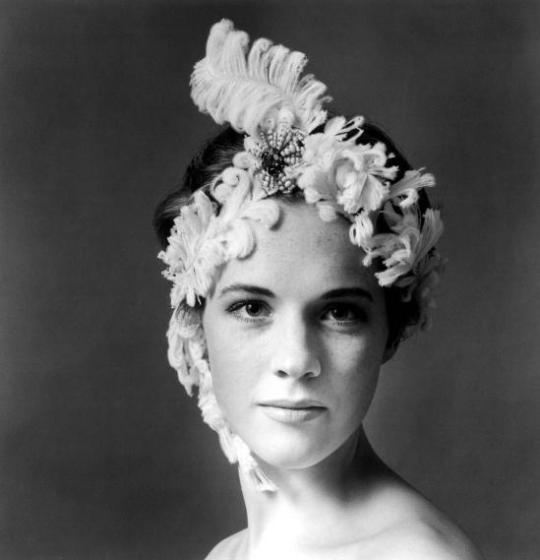

Propaganda
Julie Andrews (The Sound of Music, Mary Poppins)—Oh where to start .... I'm not sure I even know how. She's just perfection. And it's not fair I can't bring post 70s work into this, because she just gets better and better, and her drag performance in to die for. But in the era I CAN talk about, she shows she has THE RANGE. Beautiful, feisty, funny, holding her own against Christopher Plummer, Paul Newman, Rock Hudson. Oh she's luminous.
Nadira (Shree 420, Dil Apna Aur Preet Parai)— She had a blast playing the femme fatal in Indian films in the 50s. Also the costumes she wore in Shree 420 are absolutely iconic. It's important to mention that she was Jewish. She was born Farhad "Florence" Ezekiel in Baghdad to an Iraqi Jewish family. They moved to India sometime in the 1940s. The funny thing is that she originally wanted to convert to Catholicism and become a nun but joined the film industry instead as her family desperately needed money. Even though she was unfortunately typecast in femme fatale roles after playing the nightclub entertainer Maya in Shree 420, she always gave 110% to every role she was cast in. Apparently she acted in a German film as well? She was also one of the most highly paid actresses in the Indian film industry and was one of the few Indians to own a Rolls Royce.
This is round 3 of the tournament. All other polls in this bracket can be found here. Please reblog with further support of your beloved hot sexy vintage woman.
[additional propaganda submitted under the cut.]
Julie Andrews propaganda:
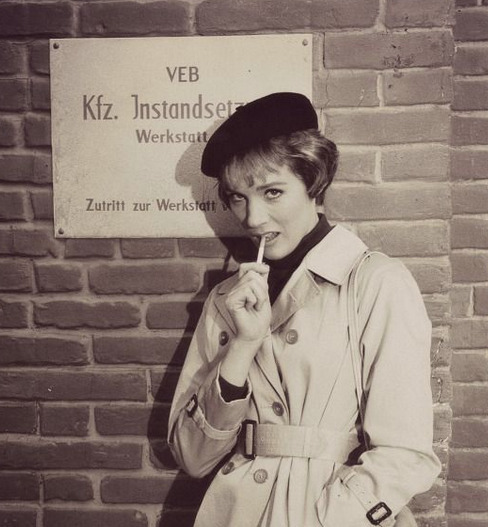
"She has such a simple but amazing beauty to her. Not to mention her amazing and melodic singing voice!"

"Roles like nannies and governesses can make us forget how attractive she was! A perfect combination of elegant and adorable, with the most incredible vocal range to boot!"

"Besides having one of the most amazing singing voices ever to grace the silver screen, Julie always had an understated beauty to her that wasn't always shown off on screen. But it's there nonetheless because her characters managed to pull some of the hottest men ever to grace the screen."

"The juxtaposition between carefree Maria and stern but fun Mary Poppins shows the power of the acting of this HOT VINTAGE MOVIE WOMAN"
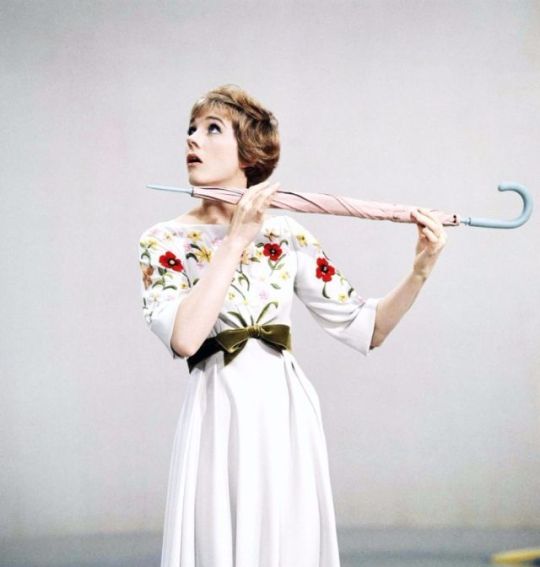
"Charming, genteel, incredibly charismatic, beautiful, and has an angelic singing voice to boot. Her screen roles as Maria in The Sound of Music and Mary Poppins are absolutely iconic for a reason and she originated several well-known Broadway roles before those."

"the most beautiful woman 12 year old me had ever seen possibly"
"OMG OMG OMG she’s definitely been submitted before how could she NOT but!!!! I loveeee her so muchhhh rahhhh prebby!!!! cool!!!! mary poppins the beloved <33333 some people dislike it but I love jolly holiday so much because it IS a jolly holiday with Mary!!! no wonder that it’s Mary that we love!!!!!"

"I know many people who were taught in singing lessons "when in doubt, pronounce words how julie andrews would pronounce them." THATS CALLED INFLUENCE. THATS CALLED MOTHERING THOUSANDS."
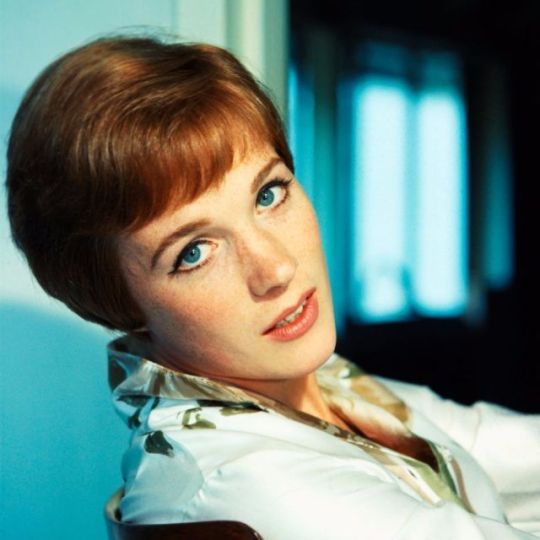
Nadira:
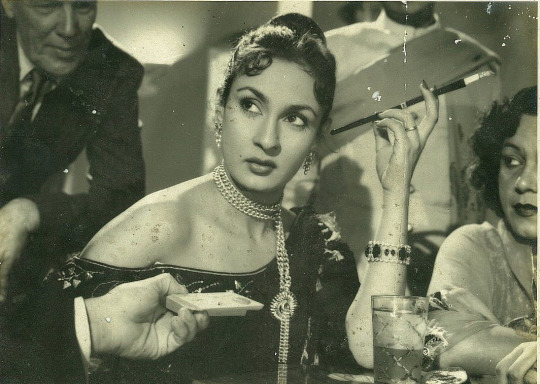
I just submitted a whole list of golden-era Bollywood stars without whom I thought this tournament could not conscionably be considered complete BUT Nadira has got my personal vote for Hottest of the lot. She played a bunch of delicious vamp roles in her youth before graduating to being a creepy spiderlady antagonist type in middle/older age. Rare is the still in which she looks like she's NOT about to gnaw your face off. Yow!

204 notes
·
View notes
Note
Hi there <3 can I request reader getting a 3some w otoya and karasu? (Love your writings x)
ᥲ/ᥒ ꜝꜝ ✎Hihi! I’m glad u like my stuff, it rlly means the world to me! Much love!
Felt like writing stoner otoya and karasu so yeah lol
HIGH FOR THIS


SYNOPSIS; what did you expect to happen when you decided to get some of the devil's lettuce with your roommates?
FEATURING; stoner roommate!Karasu Tabito x stoner roommate!Otoya Eita x fem!reader
TAGS; NSFW CONTENT! MDNI! !420!. pwp. intercourse while under the influence. fingering. oral(fem and male receiving). nicknames(princess), handjob. dirty talk.
WORDCOUNT; 1.3k
ALL CHARACTERS ARE 18+(pro players)!

"Can I join?"
Your question caused the young men to exchange a humourous glance at each other. "Our innocent little Y/N?" The green strand mocked while passing the blunt to his partner in crime, who snickered in return.
"Didn't know ya played that way." Karasu stated, earning an offended look from you in return. "Oh c'mon. You're acting like I got some stick up my ass."
"Wellll-" They both let out a laugh, eyes hanging low, effect of the plant slowly but surely kicking in. You klicked your tongue at their behaviour, rolling your eyes as you made your way to the couch, squeezing yourself between the both of them. "Just give it to me and shut up." Your hand reached to Karasus lips, snatching the joint from his lips, a chidish whine alongside of smoke coming from his parted lips, frown adoring his handsome face.
Otoya only watched in amusement as you bring the smoking stick to your lips and inhaled a fair amount before exhaling the toxic waste, head falling back onto the head rest, eyes closed in relaxation.
"Princess had a rough day?" You nodded in agreement, earning a symmetrical look from the man, both of you ignoring Karasu's whining for the joint you stole from his lips.
"Work is really kicking me in the ass right now." You admitted, your eyes trailing after Karasu's hand as he took the slim roll-up from your fingers, grinning as he inhaled the smoke.
"Fuck you", you spat at him in frustration as you watched him smoke it whole, chuckling as you punched him in the shoulder. "Don't gotta hang yer head low." His now empty hand sneaked behind your neck to pull you closer. "C'mere." His lips brushed over yours as he exhaled the vapor into your mouth, eyes not leaving the other's mouth.
"Yo," Otoya interrupted, scooting closer to you as he took your chin in hand, turning you to face him, breath tickling your nose as he whispered in a low tone. "Don't leave me out."
Your eyes widened once he captured your lips in a kiss, his tongue needily brushing past your lips once you exhale the smoke in a hurry, your hand rubbing him through his pants and grinning into the kiss once he let out a low hum. Karasu clicked his tongue at that, his hand comfortably laying on your thigh, skirt slightly riding up in the process as he leaned to the front to eye his friend. "Yer serious?"
Otoya spared him a quick glance before averting his attention back to your face, red-tinted eyes hanging low as he sighed into your mouth, his hand creeping to your thigh only to be slapped away by Karasu's. "Yer up there. Leave downstairs to me." A wide grin played itself on his features as he sank down to the ground, hand slowly hiking your leg up to his shoulder, his breath ghosting over your clothed cunt.
Otoya broke the kiss, quick to roll up another ecstasy ride, you bit your lip in excitement as you looked at the man between your thighs, eyes under heavy lips looking up at you, lust lingering behind his pupils.
You didn't know if your head was dizzy from the weed, or because of the men's actions. This was - new and unexpected. But did you mind? No. you could take your mind off with some puffs and some dick too.
A hiss escaped you once Karasu's slender fingers pushed your panties to the side, cold air hitting your aroused heat. He wasted no time sliding his fingers through your wet folds, gasping in surprise. "Ya all wet from a kiss," His fingers teased your tight hole, lips peppering kisses to your inner thigh, leaving a burning hot trail behind, "like a virgin." He locked eyes with you, a goofy expression on his face. "Are ya?"
Before you could answer your lips, the green-eyed beat you to it, blowing his exhaled fog into your face in a teasing manner. "No way. That was no virgin kissing." The men both chuckled before turning their attention back on you.
Your head flung back once Karasu's wet tongue rand over your folds, feeling Otoya's sharp eyes on you. He took another hit from the thing in his hand, manspreading while motioning his chin to his crotch. "Not gonna interrupt this time. Go on."
His eyes slit in amusement while your shaky hands freed him from his joggers, trying to bite back a moan caused by Karasu's antics. He on the other hand did not like that one bit, rolling your clit between his theeth to earn your attention, firm eyes staring daggers into your skull, a yelp leaving your lips. "Dontcha' hide yer pretty sounds. Wanna hear all of it."
Your face twisted in pleasure while you nod your head frantically, your mouth hanging open with your eyes glued to Karasu working wonders between your thighs. "Eyes on me."
Otoya turned you to him by the back of your neck, a messy kiss ascending. Your moans got swallowed by his occupied mouth, while the man between your legs swirled his tongue around your clit, tongue prodding your entrance, walls fluttering around his long muscle.
Now, finally freeing the athlete's leaking cock from his pants, he groaned into your mouth once you wrap your hands around his length, tightening around his tip to brush your finger through his slit, causing his hips to buck up in need.
"Fuckfuckfuck." He was struggling at this point, the joint in his hand shaking while he struggled to hold it, his other hand rubbing the back of your neck, urging you to lean forward. His head flung back once you kitten-licked his cock head, fingers tangling inside of your hair as his hips subconsciously stuttered up into your mouth.
"Princess 's good, ain't she?" Karasu chuckled as his mouth abandoned your cunt, replacing it with his fingers while he eyed the other man in amusement. Otoya on the other hand was in no condition to tease anymore, mind too far gone, wrapped in pleasure and toxic waste. "Mhmmm. Good, so good."
Karasu felt your walls tightening around his digits, a smug smile on his face as he observed your face. "Like it when ya get praised?" You averted your eyes from him in embarrassment, eagerly sucking the man next to you off, tongue trailing along the underside of his cock.
"Ya don't gotta be embarrassed." The athlete's movements sped up, thumb finding your clit to draw firm circles on it. "It's alright. Be a good girl and cum 'f me. I know yer close."
You moaned around the man's cock at Karasu's reassuring words, choking on a moan as you experienced your first sexual high for tonight. "Shit, princess. Look what ya did to the guy. I'm kinda jealous."
The vibration of your moans around his length threw Otoaya over the edge, his hips rutting up into your mouth, his cum seeping into your throat.
Once Karasu lapped up your gushing cunt, wiping his chin shining in your juices with the back of his hand, he slapped your thigh to earn your attention with his other, smug smirk adorning his lips. "Time ta switch." Otoya returned the smirk catching his breath whilst he came down from his high, leaving the blunt in the ashtray on the coffee table as he adjusted his pants, swiftly switching places with his friend.
"Alright," Otoya looked up at your fucked out form, his fingers already almost knuckled deep inside of your dripping hole, earning a low whimper from you.
Karasu picked up the blunt from the table, putting it to his lips while caressing your cheek with his free hand, thumb wiping some of Otoya's seed from the corner of your lips, smirking down at your form as you rest your head on his thigh, hand fidgeting with his pants while sucking he access from his finger.
"Ready?"

©︎𝐊-𝐀𝐙𝐔𝐒. all rights reserved. Do NOT plagiarize, copy, modify, republish, or translate my work in any way!
#◛⑅·˚ ᵂᴼᴿᴷ#♡˳ᴮᴸᴸᴷ#lec writes!۵#blue lock smut#bllk smut#karasu smut#otoya smut#otoya eita smut#karasu tabito smut#karasu tabito#bllk otoya#blue lock x you#blue lock x female reader
659 notes
·
View notes
Text
Being A Songwriter In A Relationship With Tarrant Hightopp Would Include

Tarrant’s eccentricities and whimsical personality easily become your greatest muse, inspiring lyrics filled with playful nonsense, dreamlike imagery, and double meanings.
In turn, your songs often influence his hat designs, incorporating musical motifs and themes into his work so the two can go together effortlessly.
Tarrant often hums along or taps out rhythms on teacups, scissors, or whatever he can find while you compose melodies or write lyrics, creating a potentially chaotic but beautiful symphony.
Tarrant also loves when you incorporate his riddles into your music with clever wordplay. He delights in how you twist and turn them into poetic verses.
On particularly hard days, you write and sing songs specifically to soothe Tarrant’s bouts of melancholy or madness. These tunes become a cherished secret between the two of you, always able to calm his heart.
Tarrant likes to get involved in your music making process by bringing in creative instruments to add a unique sound to your tunes. Anything from teacups to hatpins.
You can also expect Tarrant to craft special dances to accompany your songs. He’ll devise names for each of the dances and teach you them if you’re willing to learn.
For @simpinforfiction

Forever Tag: @baubeautyandthegeek, @ghostsunderstoodmysoul, @immyowndefender, @valencethefriendlychangeling, @crimsonwidow666, @rebelbossheart, @thedailyspiritualist, @orangeisnttheonlyfruit, @woman-simp, @aperol-with-izzy, @leonoralessoem, @ellepossum69, @lakita-fisher, @nclgsticore, @analuw, @luvlesavyy, @malfoyfeed, @aliciabrower, @sparrowspixie, @imaginationismyworldlypleasure, @og-kxsh-420
Tarrant Hightopp: @iticaboopsyou, @akeldamasemele, @danimorgan1708
#tarrant hightopp#tarrant hightopp headcanons#tarrant higgtopp x reader#alice in wonderland#alice in wonderland headcanons#request#send requests#requests open
64 notes
·
View notes
Text
I hated visiting Instagram. It's the corniest place on the internet. I'm not kidding. You've never seen a bigger group of phonies in your entire life. There was this girl called Chiara Ferragni who had about a million posts about how much she loved Nespresso. That just killed me. It really did. Her followers in the comments were kicking their heads off about how gorgeous and talented she was. People who follow influencers always do that. Act like they're great friends or something and just the swellest people you can imagine. I sort of hated old Chiara for her phony smile and twenty thousand emojis and the way she acted like Nespresso was just the grandest thing in the world. Grand. I hate that word. What kills me is that she got a tidy paycheck for writing those snobby, phony posts. She really did! Strictly commercial. But her followers slobbered all over her. For Chrissake.
(J.D. Salinger - The Catcher in the Rye, new and revised edition with previously missing chapters, page 420)
#the catcher in the rye#holden caulfield#jd salinger#this is a direct quote from the book btw!#i just figure holden would hate instagram#i used the name of a random influencer from a list of biggest instagram celebs#really i don't know who she is beyond a screenshot of one post#i just think the whole culture would rub holden the wrong way something fierce
81 notes
·
View notes
Text
GiGS vol. 420 (October 2015)
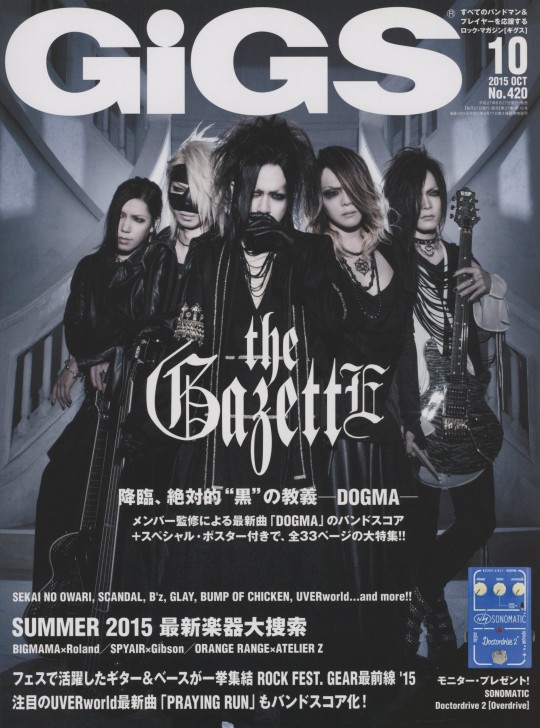
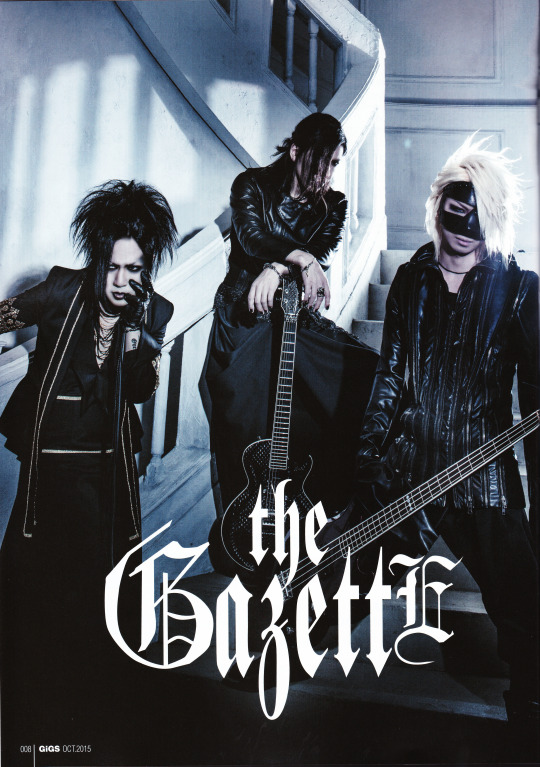
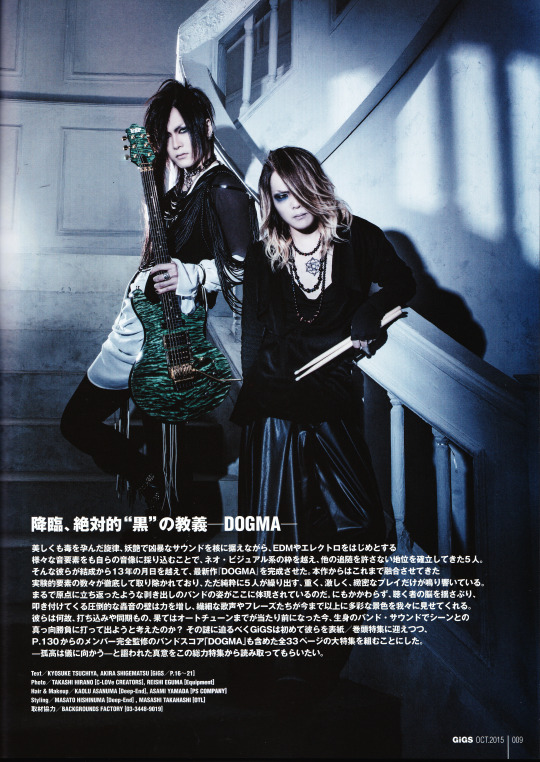
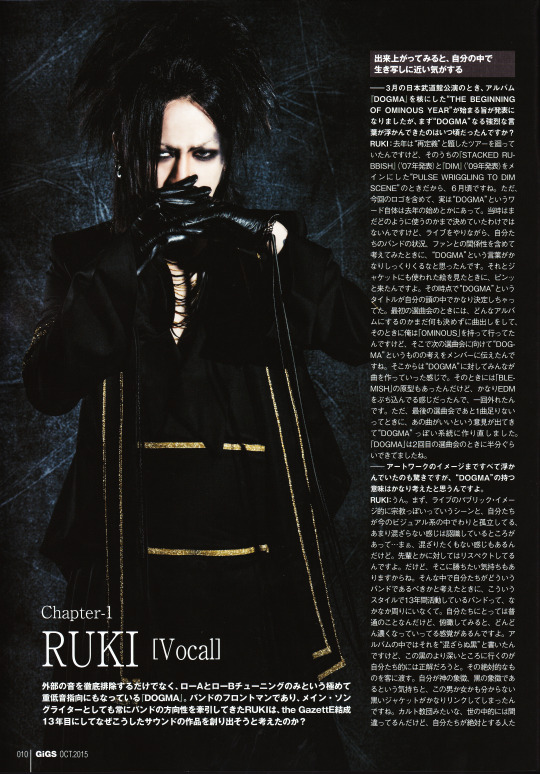
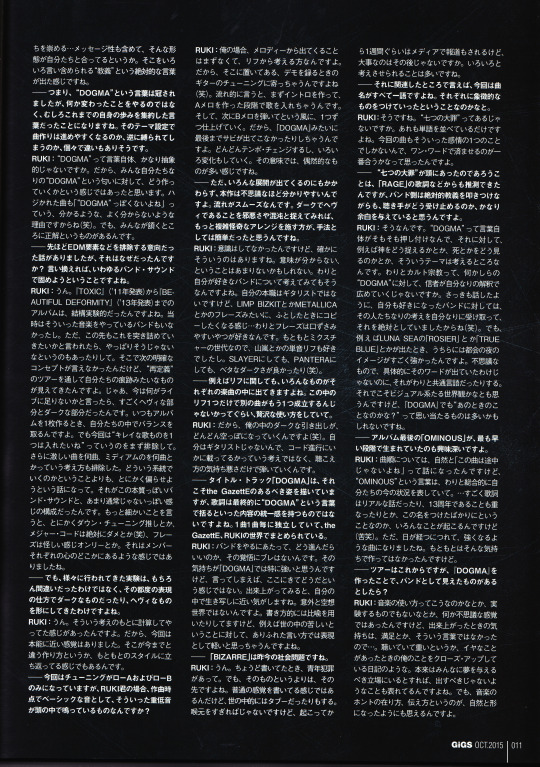
Chapter 1 - RUKI [Vocal]
“DOGMA”, with its intense focus on low frequencies, eliminates external sounds entirely, utilizing only low-A and low-B tunings. As the band’s frontman and primary songwriter, RUKI has always steered the direction of the GazettE. Why, after 13 years since the band’s formation, did they choose to create an album with this kind of sound?
“When the album was finished, I felt it was almost like an exact reflection of myself.”
Interviewer: At the March performance at Nippon Budokan, it was announced that THE BEGINNING OF OMINOUS YEAR, centered around the album DOGMA, would begin. When did the powerful word "DOGMA" first come to mind?
RUKI: Last year, we had a tour titled Redefinition. Among those shows, we had PULSE WRIGGLING TO DIM SCENE, which focused on STACKED RUBBISH (released in 2007) and DIM (released in 2009), so it was around June. However, the word DOGMA itself, including the album cover design, had already existed as early as the beginning of last year. Back then, I hadn’t decided exactly how to use it yet. But as we continued performing live, I began reflecting on the state of our band, our relationship with our fans and the term DOGMA felt very fitting.
When I saw the artwork used for the album cover, it all came together. By that point, the title DOGMA had already been cemented in my mind. For our first song selection meeting, we hadn’t decided on what kind of album it would be yet; we just brought in songs. At that time, I brought in “OMINOUS.” It was during this process that I shared my idea of “DOGMA” with the other members as a direction to aim for in the next selection meeting. From there, everyone started creating songs with “DOGMA” in mind.
There was an early version of BLEMISH, but it had a strong EDM influence, so we set it aside. However, at the final song selection meeting, when we realized we needed one more track, someone suggested bringing that song back and reworking it into a more DOGMA-esque style. By the second song selection meeting, about half of the album was completed.
Interviewer: It’s surprising that you had the artwork’s image in mind so early on. I assume you also thought deeply about the meaning behind “DOGMA.”
RUKI: Yes. First, from the perspective of our public image during live performances, there’s this religious-like aura. At the same time, we’re aware of our somewhat isolated position within the current visual kei scene—we don’t really mix with others. Though, honestly, we don’t want to mix either. Of course, we respect our predecessors in the genre, but we also have a desire to surpass them.
When we considered what kind of band we should be, we realized that there aren’t many bands like us that have maintained this style for 13 years. It’s something natural for us, but if I take a step back and look at it from a bird's-eye view, it feels like our essence keeps becoming denser. In the album, we described this as "unmixable black." For us, delving deeper into that blackness felt like the right path. Our goal was to hand over something absolute to our audience.
The idea of myself as a symbol of divinity, symbol of blackness, resonated deeply with the androgynous figure on the black album jacket. It evokes the image of a cult—one that society might see as misguided, but which worships its own absolutes. That message, that structure, felt perfectly aligned with who we are. From there, the absolute term ‘dogma’ naturally emerged.
Interviewer: In other words, while the word “DOGMA” became the title, it wasn’t about doing something completely different. Instead, it served as a term that encapsulated your journey so far. With that as the theme, did it make the songwriting process easier, or did it feel restrictive? It seems like this could differ for each of you.
RUKI: The word DOGMA itself is pretty abstract, right? So everyone approached it by interpreting what DOGMA meant to them. Songs were rejected for reasons like, “This doesn’t feel like DOGMA,” which is both understandable and a bit vague (laughs). But when everyone agreed on something, that became the “right” answer.
Interviewer: You mentioned earlier that EDM elements were intentionally removed. Why was that? In other words, was it an effort to focus on a more traditional band sound?
RUKI: Yes. From TOXIC (released in 2011) to BEAUTIFUL DEFORMITY (released in 2013), our albums were quite experimental. At the time, there weren’t many bands doing that kind of music. But we questioned whether we wanted to continue pursuing that direction, and the answer was no. While we didn’t have a clear concept for what to do next, through the “Redefinition” tour, we started to see traces of ourselves—what made us who we are.
Then we asked ourselves, “What is the current live experience missing?” And the answer was something much heavier and darker. Whenever we make an album, we usually balance different aspects within ourselves. But this time, we first decided to eliminate the idea of including “at least one clean, melodic song.” We also threw out the approach of trying to balance things like “how many heavy songs, how many medium-paced ones” and so on. Instead of worrying about maintaining a variety, we decided to focus on leaning into extremes.
That’s why the album structure ended up with a sound that felt like a band’s raw essence but also unconventional at the same time. To get into more specifics, we really pushed down-tuning, completely banned major chords (laughs), and insisted on phrases that felt eerie and unsettling. I think these ideas were something that existed within each of the members’ hearts somewhere.
Interviewer: Still, the various experiments you’ve conducted weren’t mistakes. They were ways of shaping darkness and heaviness through different methods of expression at the time, weren’t they?
RUKI: Yeah, there was definitely a calculated aspect to it. But this time, it felt much closer to instinct. That’s what makes the process different from before, and in a way, it also feels like we’ve returned to our original style.
Interviewer: For this album, you’ve used Low A and Low B tunings exclusively. When composing, do those heavy bass tones naturally sound in your head as the foundation?
RUKI: For me, it doesn’t start with a melody but with a riff. So, the tuning of the guitar I use for recording demos often influences the process (laughs). Usually, I’ll begin with the intro, then add the verse, and by that point, I’ve already layered vocals. Then I create the bridge and so on, building one section at a time. That’s why, with a song like DOGMA, the chorus might not even appear until the very end. The tempo keeps changing, and the structure evolves. In that sense, it’s a very spontaneous process.
Interviewer: Despite all these evolving developments, the album is surprisingly cohesive. The flow is seamless. If one considers “darkness” and “heaviness” as themes that suggest evil and chaos, it might have been simpler, in terms of technique, to go for a more convoluted, chaotic arrangement.
RUKI: I wasn’t consciously aware of that, but I think you’re right. There’s not much that feels incomprehensible. Even with bands I admire, I notice that. I’m not a guitarist by trade, but I love riffs that make you want to copy them on a whim, like those from Limp Bizkit or Metallica. I’m from the nu-metal generation, so I also like single-note riffs from bands like YamaArashi. Even with Slayer or Pantera, there’s something great about straightforward classic darkness (laughs).
Interviewer: Speaking of riffs, each track features so many distinct ones that any single riff could serve as the basis for an entirely new song, yet you use them so lavishly.
RUKI: That’s why the dark drawer in my mind keeps getting emptied out bit by bit (laughs). Since I’m not a guitarist, I don’t think in terms of how the riffs fit into chord progressions. Instead, I just play based on how unsettling they sound to me.
Interviewer: The title track, DOGMA, truly captures what the GazettE stands for. However, the lyrics aren’t bound by the term “DOGMA” as a unifying theme. Each song feels distinct, yet they’re all brought together by the world of the GazettE and RUKI.
RUKI: When it comes to this band, there’s no hesitation about the direction we need to take. That resolve is particularly strong in “DOGMA.” But to put it bluntly, it’s not about how things have suddenly come together here. When the album was finished, I felt it was almost like an exact reflection of myself. It’s surprisingly not a fantastical world. Though I use metaphors in my writing, when addressing topics like the struggles of society, I feel that expressing them in clichéd ways would come across as too superficial.
Interviewer: For example, you’ve mentioned that BIZARRE reflects recent social issues.
RUKI: Yeah. While I was writing it, there was a youth crime incident happening. But it’s not so much about the event itself as what comes afterward. I write about it from what feels like an ordinary perspective, but to society, it might be a taboo. It’s like that saying “once it’s out of sight, out of mind”—for about a week after an event, the media covers it, but the important part is what happens afterward, isn’t it? These kinds of things make me think a lot.
Interviewer: On a related note, this time all the track titles are single words. It seems like each word was chosen to be highly symbolic.
RUKI: That’s right. You know the concept of the “seven deadly sins”? They’re just listed as single words, aren’t they? The songs on this album similarly represent just one emotion each, so I felt that single-word titles suited them best.
Interviewer: The influence of the “seven deadly sins” concept is apparent, especially in lyrics like those in “RAGE.” However, while the band delivers its absolute doctrine, it feels like you leave a lot of space for listeners to interpret things in their own way.
RUKI: That’s right. The word “DOGMA” itself is inherently imposing. So it’s about how you interpret things like God, or how you perceive death—those are the themes being explored. Cult religions, for example, often take some form of “DOGMA” and have their followers spread it through their own interpretations, don’t they? Like I mentioned earlier, when I fell in love with certain bands, I absorbed their messages in my own way and took them as absolute (laughs).
But, for example, when songs like LUNA SEA’s “ROSIER” or “TRUE BLUE” were released, for us, they conjured a strong image of the city at night. It’s strange because those words weren’t explicitly referencing that, yet they became a shared language of sorts. I think that’s the essence of the visual kei world—the ability to evoke such collective imagery. Similarly, with DOGMA, listeners might connect it to certain moments in their lives.
Interviewer: It’s fascinating that OMINOUS, the final track on the album, was one of the first songs created.
RUKI: When deciding on the track order, it naturally felt like “this song doesn’t belong in the middle.” The word OMINOUS represents our current state as a band. The song has real, raw lyrics and coincides with our 13th anniversary. It feels like naming it that brought about various events (laughs). Over time, the track has grown stronger. Initially, we didn’t create it with those emotions, but it ended up carrying them.
Interviewer: As you head into the tour, what do you think creating “DOGMA” has revealed about the band?
RUKI: It’s made me think about how music is meant to be used—not as an experiment but as a medium for genuine expression. When it was finished, my feelings weren’t ones of satisfaction or anything like that. Listening to it feels heavy—it’s like a diary zooming in on my thoughts during tough times.
Normally, we’re expected to inspire dreams, but some of what’s conveyed here might not align with that role. But in a way, I feel like the essence of music—how it truly should exist and how it should be conveyed—naturally took form through this process.
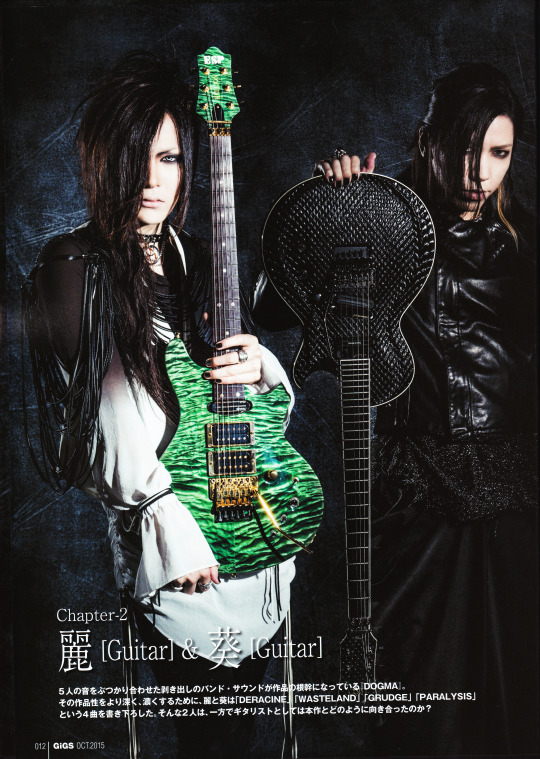
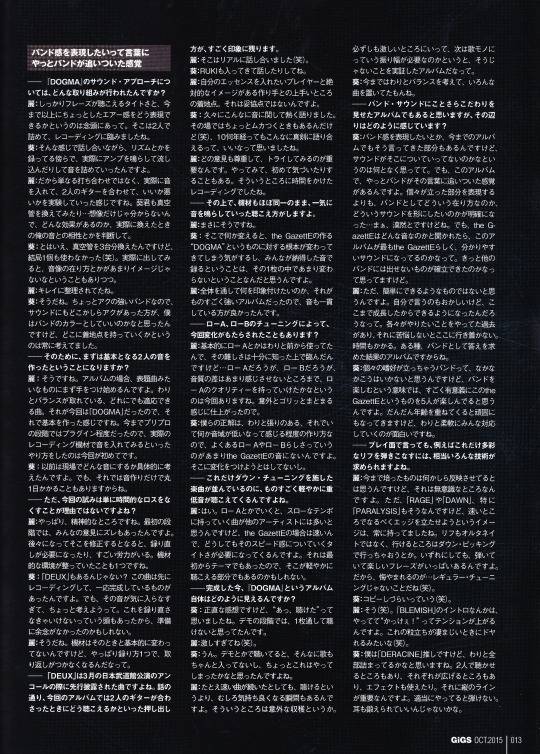
Chapter 2 - Uruha [Guitar] & Aoi [Guitar]
The raw and unfiltered band sound, crafted by the clash of all five members’ music, forms the foundation of “DOGMA.” To enrich and deepen the essence of this work, Uruha and Aoi wrote four tracks: “DERACINE,” “WASTELAND,” “GRUDGE,” and “PARALYSIS.” As guitarists, how did the two of them approach this album?
Interviewer: What kind of approach did you take toward the sound of DOGMA?
Uruha: We focused on achieving a tight sound where each phrase could be heard clearly, while also exploring how to incorporate a subtle sense of airiness, more so than ever before. That was something the two of us worked on extensively before heading into recording.
Aoi: While discussing things like that, we would be recording the rhythm parts, and at the same time, we’d crank up the amps and pour the sound into the mix, refining it bit by bit.
Uruha: So it wasn’t just a simple meeting. It felt more like we were experimenting by actually playing and layering the sounds of our two guitars, judging whether it worked or not. Aoi even swapped out vacuum tubes… You can’t really understand the impact just by imagining it. So we’d listen to the changes and judge how well it meshed with my sound.
Aoi: That being said, I replaced three tubes, but in the end, we didn’t use a single one (laughs). When I actually heard the sound, it didn’t quite match the image I had in mind for the tonal balance.
Uruha: Everything ended up sounding very clean and organized.
Aoi: Yeah. Since we’re a band with a fairly strong “bite,” I thought having a bit of grit in the sound would be better for expressing our unique color. But I was always thinking about where to find the right balance for the final result.
Interviewer: So, does that mean you first focused on creating the foundation of the two guitars' sounds?
Uruha: That’s right. When working on an album, we usually start with something like the title track—a song that has a relatively well-balanced sound and can adapt to anything. This time, that song was "DOGMA," so we built the foundation around that. Up until now, the pre-production stage mostly involved plugins, but this time, we actually used the recording equipment during pre-production to get the sound. That was a first for us.
Aoi: Previously, we’d only think about what kind of sound we wanted on the spot during the session. But that approach could mean spending an entire day just crafting a single sound.
Interviewer: But, the purpose of this new approach wasn’t simply to save time, right?
Uruha: It’s about the mental side of things. At the beginning, there were some discrepancies in everyone’s opinions. If we had to fix those differences later, it would mean re-recording and putting in an enormous amount of effort. Having the right technical setup from the start was a big factor as well.
Aoi: DEUX might have been part of it too, don’t you think? We had recorded that song earlier and thought it was finished. But I just couldn’t stand the sound of it, so we decided to rethink things. Knowing that we might have to re-record it probably pushed us to prepare even more thoroughly.
Uruha: That’s true. The equipment itself hasn’t changed much since then, but just the way you record something can lead to results you can’t take back.
Interviewer: DEUX was performed as an encore during your Nippon Budokan show in March, right? As you mentioned, the way the two guitars blend on this album is particularly striking.
Uruha: That’s something we discussed in detail (laughs).
Aoi: Ruki also joined in on those discussions.
Uruha: It’s about finding the ideal balance between a player’s desire to add their essence and a creator’s absolute vision. It’s not about compromise.
Aoi: It’s been a long time since I’ve had such passionate discussions about sound. It can be frustrating in the moment (laughs), but even after all these years, being able to have such serious conversations is something I really appreciate.
Uruha: It’s important to respect all perspectives and try things out. There are insights you can only gain after trying things. This recording process really emphasized that.
Interviewer: And despite all this effort, the sound seems unified, as if the equipment remained consistent throughout.
Uruha: That’s right.
Aoi: If we were to change something, it feels like it would fundamentally alter what the GazettE’s "DOGMA" is supposed to represent. Recording with a sound that everyone agreed upon also meant that the tonal consistency across the album wouldn’t fluctuate too much.
Uruha: Since the album had such a strong and clear theme throughout, keeping the sound consistent was the best choice.
Interviewer: Did the use of low A and low B tunings contribute to this evolution?
Uruha: We’ve used low A tuning before, so we were aware of its challenges. But this time, I think we managed to elevate the quality to the point where you can’t distinguish much between low A or low B in terms of tonal quality. It came together in a surprisingly solid way.
Aoi: Our "right" answer tends to be a sound that’s bright and taut, yet gives a subtle impression of being lower in range. The typical characteristics of low A or low B tunings don’t really fit the GazettE’s sound, so we didn’t aim to emphasize them either.
Interviewer: It’s remarkable how the songs employ such heavy downtuning yet still deliver low-end sounds with such a light, effortless quality.
Uruha: Yeah. When artists use low-A tunings, they often go for slower-tempo songs. But in the GazettE’s case, the songs are fast, so we needed a tightness that could keep up with that speed. That was something we set as a theme from the start, and I think it contributes to why the sound feels so light and agile.
Interviewer: Now that it’s finished, how do you see the DOGMA album as a whole?
Aoi: Honestly, my first reaction was, “Ah, I can listen to it.” During the demo phase, I didn’t think I’d be able to listen to it all the way through.
Uruha: It was too intense (laughs).
Aoi: Yeah. In the demo stage, the vocals weren’t fully recorded, and I wondered if we had gone too far.
Uruha: Even when fast-paced tracks follow one after another, there are moments that don’t just feel listenable—they actually feel good. That was an unexpected discovery for me. This album proved that it’s not necessarily essential to switch between heavy tracks and more melodic ones to create variety.
Aoi: In the past, we usually aimed for balance by including a variety of songs.
Interviewer: This album seems to emphasize the band’s sound more than ever. How do you feel about that?
Aoi: We’ve talked about wanting to express a “band feel” on previous albums, but I always felt like our sound hadn’t fully caught up to that idea. With this album, though, I feel like the band has finally caught up to that concept. Instead of focusing on highlighting individual parts, we really clarified what it means to exist as a band and what kind of sound we wanted to create as a whole. It’s still a bit abstract, but if someone asked, “What is the GazettE’s sound?” I think this album represents it in the clearest, most GazettE-like way. I also feel like we’ve established something unique that other bands wouldn’t be able to replicate.
Uruha: That said, this isn’t something that can be easily achieved. It's weird for me to say it, but I think we were only able to do this because we’ve grown so much as a band. Each of us had a period in the past where we were focused on doing what we wanted individually. Without struggling through that phase, we wouldn’t have arrived here. It takes time. In a sense, this album is the result of seeking answers as a band.
Aoi: Bands where the individual members’ preferences dominate can’t really pull something like this off, I think. But I think the five of us really enjoy being in the GazettE together. Even as we grow older and maybe more set in our ways, everyone is surprisingly flexible. That’s something I find really interesting.
Interviewer: Speaking of your playing, mastering such a wide variety of riffs must have required a considerable amount of technical skill, right?
Uruha: I think we naturally reflect what we’ve built up over time, even if we’re not always conscious of it. For tracks like “RAGE,” “DAWN,” and especially “PARALYSIS,” I always had this image of trying to emphasize sharpness and clarity in the faster sections. For example, instead of relying on alternate picking, I’d push to use down-picking where possible. But in any case, the riffs are genuinely fun to play. What I regret, though, is... that it’s not in standard tuning (laughs).
Aoi: Makes it harder for people to copy (laughs).
Uruha: Exactly (laughs). Take the intro of “BLEMISH”, for instance—playing it gets me hyped, like, “This is so cool!” It’s that moment when the sound is crisp and precise, and you can really show off (laughs).
Aoi: My favorite is “DERACINE.” I think it has a little bit of everything. There are moments where we play together, times where we each expand the sound in our own way, and opportunities to use effects. Plus, the vertical alignment of the parts is crucial. If you’re sloppy, you can’t pull it off. It’s a challenge for your ears, too, so I think it’s good practice.

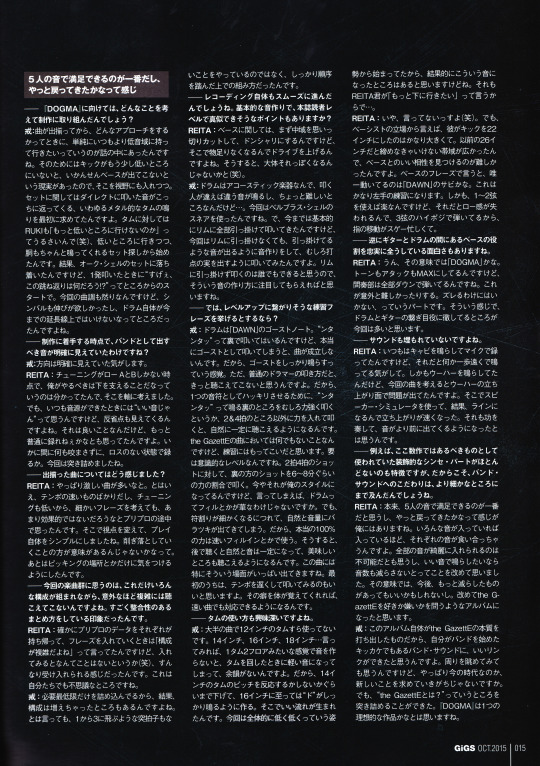
Chapter 3 - REITA [Bass] & Kai [Drums]
The album “DOGMA” features an unprecedented low-end heaviness that spans its entirety. For REITA and Kai, who are responsible for anchoring the band’s sound, this required heightened awareness and innovation in both playing and sound production. In this chapter, we explore what the two of them focused on during the album’s creation.
Interviewer: What kind of thoughts went into the production process for DOGMA?
Kai: Once we had the tracks ready, we talked about how to approach them. One key idea was to bring more focus to the low-end frequencies than usual. To achieve that, the kick drum needed to sit lower in the mix, because otherwise, the bass wouldn’t come through clearly. With that in mind, I started by considering the drum setup. Initially, I aimed for toms that would give a more direct, metallic resonance, like what you often hear in metal. RUKI was quite particular, saying, “Can’t you go lower?” (laughs). So, we began with finding a kit that could deliver a low sound while still allowing the shells to resonate properly.
We ultimately settled on an oak-shell kit. When I hit it for the first time, I thought, “Whoa, what is this incredible rebound!?” That was the starting point. The nature of the tracks this time also called for cymbals with more sustain, so it felt like I couldn’t stick to the same approach as before. The drums had to evolve beyond the familiar.
Interviewer: It seems that by the time you started production, you already had a clear vision for the sound the band wanted to create.
Kai: Yes, I feel like we had a clear direction.
Reita: When the tuning is as low as A or B, I knew my job was to provide a solid foundation for the sound. That became my focus. Whenever we finish recording, I always think, “This sounds great,” but I also notice areas to improve. That’s a good thing, of course, but at the same time, I found myself wondering if we couldn’t record more simply. How do we capture the sound with as little interference and loss as possible? That’s what we really honed in on this time.
Interviewer: How did you feel about the finished tracks?
Reita: I thought, “Wow, there are a lot of intense tracks!” But since the tempos are fast and the tuning is low, I realized midway through the pre-production process that intricate phrases wouldn’t be very effective. So, I shifted my approach to make the playing itself simpler. Stripping things down felt more meaningful. After that, I just focused on details like where I placed my picking hand.
Interviewer: Despite the variety in these songs' structures, they don’t sound overly complex. Instead, they feel like they’ve been tied together with a great sense of cohesion.
Reita: That’s true. During pre-production, when we took the demo data home to work on our parts, we’d say, “The structures are pretty complex,” but once we actually added the parts, it all came together surprisingly smoothly (laughs). It felt natural, which was a bit of a mystery even to us.
Kai: I think it’s because we packed in only the essentials. As a result, some of the arrangements became more elaborate, but it’s not like we jumped randomly from point A to point C. The songs follow a clear progression, which made the structures feel logical.
Interviewer: Did the recording process itself go smoothly? Are there any techniques for basic sound production that our readers might be able to replicate?
Reita: For the bass, the first step is to cut the mid-range completely to create a scooped sound. That can feel a bit lacking, so you boost the drive, and it starts to sound right (laughs).
Kai: Drums are acoustic instruments, so the sound changes depending on who’s playing, which makes it a bit tricky. This time, I used a bell brass snare drum. Normally, I play with all the hits catching on the rim, but this time I worked on creating a tone that sounded like it was caught on the rim even when it wasn’t. Instead, I focused on producing a sound that emphasized the core of the drum hit. Since anyone can try playing without using the rim, I’d recommend experimenting with that kind of sound design.
Interviewer: Are there any practice routines you’d recommend that might help with skill improvement?
Kai: For drums, I’d recommend the ghost notes in "DAWN." The notes played in the background go like "nta nta-t." While they’re ghost notes, if you treat them as true "ghosts," the song won’t work. The key is to make those ghost notes resonate clearly. For most drummers, these notes might not even be audible, but to make them distinct, you need to hit those background beats with more force—almost as if emphasizing the notes that aren’t on the primary 2 & 4 beats. Doing this makes the sound feel steady and even. For the GazettE’s songs, this isn’t anything extraordinary, but it’s perfect for practice.
It comes down to intentional focus. While your usual power goes to the 2 & 4 beats, you should apply around 60-80% strength to the offbeats. This has become my personal style now. Drumming often shines through fills, but as the note groupings get denser, volume inconsistencies start creeping in. So, I save my true 100% effort for fast fills, which, when listened back to, helps everything sound natural and balanced, with all the details standing out clearly. This track, in particular, is packed with opportunities to practice that approach. Initially, try playing it at a slower tempo. Once your body adapts, it will naturally work for faster songs too.
Interviewer: Your tom usage is also fascinating.
Kai: In most of the songs, I don’t even use the 12-inch tom. It’s more like a setup of one tom and two floor toms—14-inch, 16-inch, and 18-inch. If I included the smaller tom, the overall sound would get too light and lose its resonance. To avoid that, I tuned the 14-inch tom as low as it could go while still responding clearly. For the 16-inch, I tuned it so it firmly produced a deep "do" sound. This approach created a really good flow.
Because we started this album with the concept of going lower and lower overall, this setup naturally led to the final sound. Part of this was because Reita kept saying he wanted to go even lower…
Reita: No, I didn’t say that! (laughs) But from the bassist’s perspective, Kai switching to a 22-inch kick drum was a huge change. With the previous 26-inch, there was too much range that needed to be tightened, which made it harder to create a good match with the bass.
For basslines, the only part that really moves around is in the chorus of "DAWN." That section is great for practicing left-hand techniques. You could make it easier by playing it on the first and second strings, but you’d lose the low-end presence, so I play it on the third string in the higher positions. This makes the finger movements insanely busy.
Interviewer: There’s also a satisfying sense of how the bass holds its ground between the guitars and drums.
Reita: Yes, DOGMA exemplifies that. I maxed out both tone and attack, especially in the interlude, where I played everything with downstrokes. It’s harder than it sounds because you can’t afford to let the timing slip even a little. There are a lot of moments on this album where I took on the role of bridging the drums and guitars.
Interviewer: The bass sound doesn’t feel buried at all.
Reita: Usually, I’d run my sound through a cabinet and mic it, but that often feels like the sound is coming from a slight distance. I was also using a woofer, but for this album, the woofer’s responsiveness was causing issues. So, I switched to a speaker simulator. That resulted in a line-out setup, which improved the attack and brought the sound forward more prominently. I think that worked really well to make the bass stand out.
Interviewer: One of the defining features of this album is the absence of decorative synth parts, which were used in some of your recent works. This seems to have pushed your focus on the band sound into even finer detail.
Reita: I think the most satisfying thing is to feel content with the sound the five of us create. It feels like we’ve finally returned to that. The more layers you add, the more the individual sounds clash. It’s impossible to get everything to sit perfectly in the mix. This time, I realized again that if we want a good, clean sound, we have to reduce the number of elements. Going forward, we might strip things back even further. I feel like this album challenges listeners to decide whether they truly like the GazettE or not.
Kai: This album is a true representation of the GazettE’s essence. It ties back to why I started playing in a band in the first place—the joy of creating a real band sound. Looking around, I think there’s a tendency these days to chase the new and experimental. But we really dug deep into “What is the GazettE?” with this work. I think "DOGMA" turned out to be an ideal album in that respect.
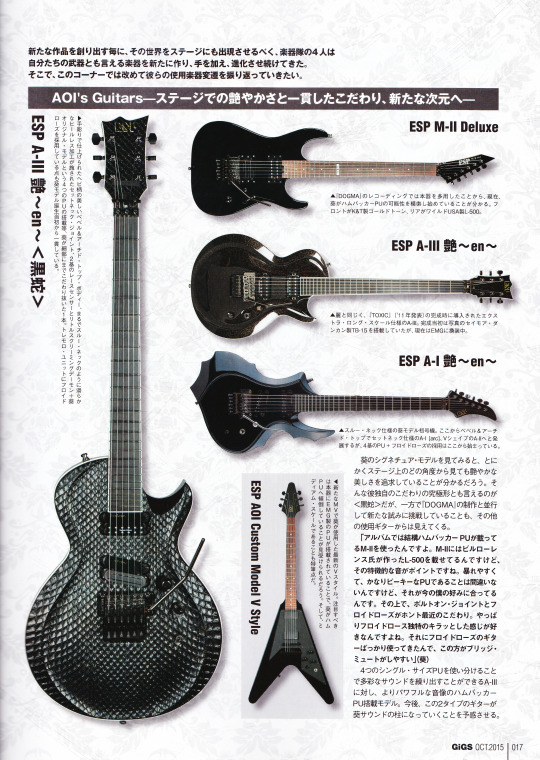
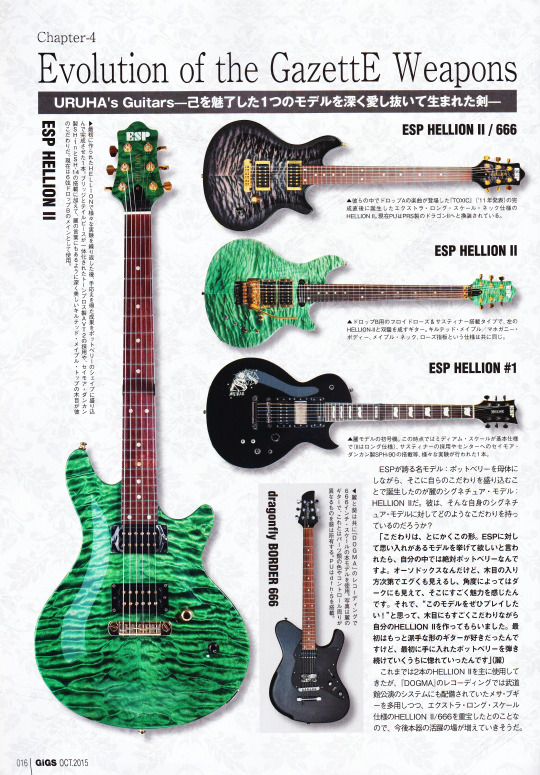
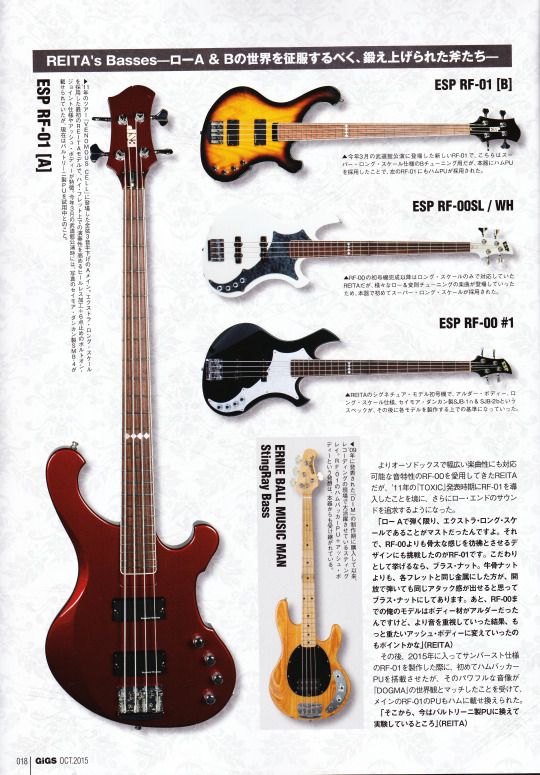
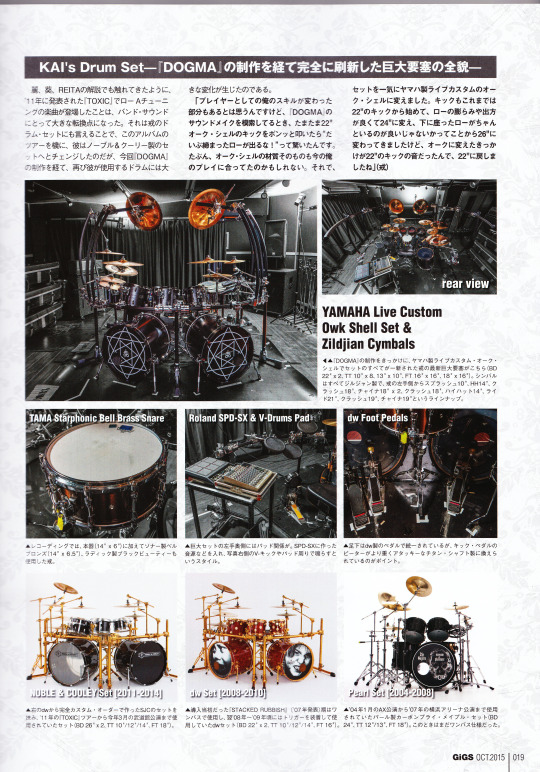
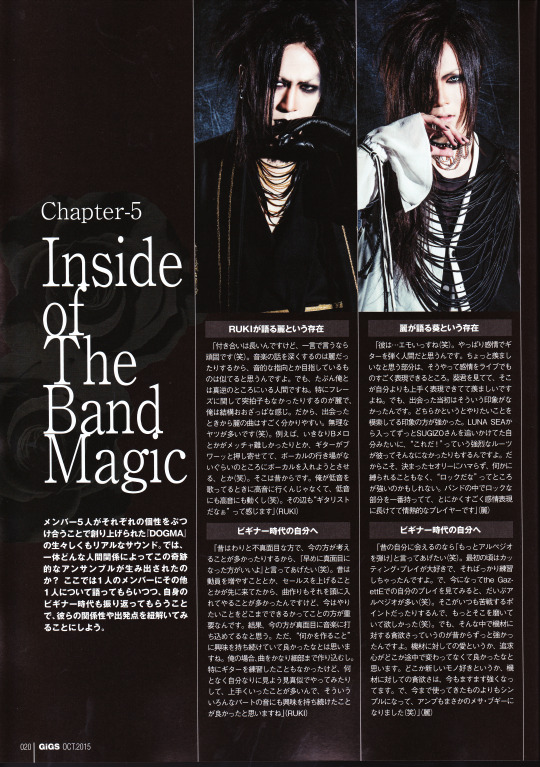
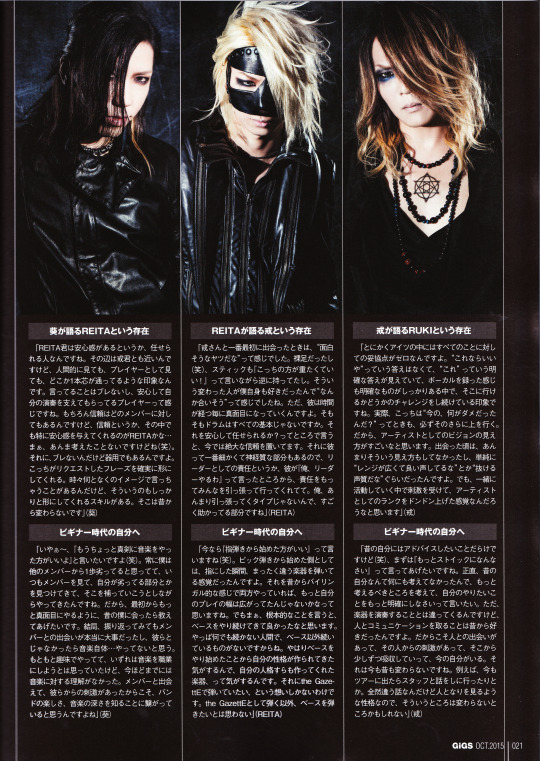
Chapter 5 - Inside of The Band Magic
The raw and real sound of DOGMA was created through the clashing and blending of the unique personalities of The GazettE's five members. What kind of relationships made this miraculous ensemble possible? In this chapter, we have each member talk about one of the others while also reflecting on their early days. Through this, we aim to unravel their relationships and their starting points.
RUKI on Uruha
“Our relationship goes back a long way, but if I had to sum him up in one word, he’s stubborn (laughs). When it comes to in-depth discussions about music, Uruha is usually the one I talk to. I think our musical inclinations and goals are similar, but he’s probably the complete opposite of me in many ways.
Especially with his phrasing—Uruha’s ideas are often experimental, while I tend to be more rough and ready. So, from the moment we met, his songs were always very distinctive. A lot of them were also… difficult (laughs). For example, suddenly throwing in a really challenging B melody, or having the guitar surge forward so much that the vocals barely have room to fit in. And then he expects me to make it work somehow (laughs). That’s something that hasn’t changed since back then.
Even when I’m singing in a low register, he’ll have me shift to both lower and higher tones. In moments like that, I really feel, ‘This guy is such a guitarist...’”
To my beginner self (Ruki):
“I used to be pretty laid-back, so I’d tell my younger self, ‘Start taking things seriously sooner’ (laughs). Back then, I was more focused on increasing our audience or boosting sales, so I often made music with that in mind. Now, what matters most is how far we can go with what we want to do.
As a result, I feel like I’m more dedicated to music now than ever before. At the same time, I’m glad I’ve always stayed interested in creating something. I’m the kind of person who likes to get deep into the details of a song. Even though I never formally practiced guitar, I often tried to figure things out by watching others or experimenting on my own. Those experiences taught me a lot, and I’m glad I kept exploring all the different elements of sound.”
Uruha on Aoi
“He’s… very emotional (laughs). I think he’s someone who plays guitar with his feelings. I honestly envy his ability to express so much emotion, especially during live performances. Watching him, I feel he’s better at expressing himself than I am, and that’s something I admire.
But that wasn’t my impression when we first met. Back then, he seemed more like someone who was still figuring out what he wanted to do. Unlike me, who had this strong, ‘This is it!’ moment from my LUNA SEA roots and obsession with Sugizo, Aoi didn’t seem to have one defining influence.
Because of that, he’s not bound by any particular rules or conventions, which might make him more ‘rock’ in a way. Among the band members, he has the strongest rock spirit. Overall, he’s an incredibly emotional and passionate player.”
To my beginner self (Uruha):
“If I could meet my younger self, I’d say, ‘Practice your arpeggios more!’ (laughs). Early on, I loved cutting-style guitar playing and practiced that nonstop. But looking at my parts in The GazettE now, there are so many arpeggios (laughs). That’s always been a challenging area for me, and I wish I’d worked on it more back then.
On the other hand, I’ve always had a strong curiosity about gear, and I’m glad that hasn’t changed. My love and passion for equipment have only grown stronger over time. I’ve also started simplifying things—I’ve even switched to a Mesa Boogie amp (laughs).”
Aoi on Reita
"REITA gives a sense of reassurance; he’s someone you can rely on. In that sense, he’s similar to Kai. As a person and as a player, he gives the impression of someone with a strong core. He’s consistent in what he says, and I always feel secure knowing my performance is supported by him. Of course, I trust all the members, but REITA is the one who gives me the most peace of mind... Well, I haven’t really thought about it much (laughs).
At the same time, while he’s steadfast, he’s also very skilled. If I request a specific phrase, he always brings it to life. Sometimes I just give a vague idea, and he still manages to shape it into something tangible. That skill has been a constant since the early days.”
To my beginner self (Aoi):
“Oh man, I’d definitely tell myself, 'You should take music more seriously’ (laughs). I’ve always felt like I was a step behind the other members. I’d watch them, figure out where I was lacking, and work on improving those areas. If I could meet my younger self, I’d tell him to be more serious from the start.
Looking back, meeting the other members was such a pivotal moment. If it weren’t for them, I don’t think I’d even be doing music. I originally started music as a hobby and thought I might turn it into a career someday, but I didn’t understand it as deeply as I do now. The inspiration and stimulation I’ve gotten from them have shown me the joy of being in a band and the depth of music.”
REITA on Kai
"When I first met Kai, I thought, 'He seems like an interesting guy.’ He was barefoot (laughs) and held his drumsticks the opposite way, saying, 'This feels heavier, so it’s better!’ I’ve always liked quirky people, so I thought we might get along. But as time went by, he became increasingly serious.
Drums are the foundation of everything, aren’t they? Whether you can fully trust someone to handle that responsibility is crucial, and I now place absolute trust in him. Kai’s also the most meticulous and detail-oriented among us. When he decided to take on the role of leader, he really took responsibility and started guiding everyone. Since I’m not the type to lead, I’m super grateful for that."
To my beginner self (REITA):
"I’d tell myself, 'Start with fingerpicking.’ Coming from a pick-playing background, switching to fingerpicking felt like learning a completely different instrument. If I’d been doing both from the start, I think my range as a player would’ve been broader.
That said, at the core, I feel glad I stuck with playing bass. I’ve never been someone who sticks to things for long, and bass is the only thing I’ve kept doing. It feels like picking up the bass shaped my personality and even my identity. It’s more than just an instrument; it’s part of who I am. And honestly, I only want to play bass as part of The GazettE. Outside of that, I don’t feel any desire to play."
Kai on RUKI
"RUKI doesn’t compromise on anything. There’s no ‘This is good enough’ for him; He always has a clear vision of what he wants, and when he records vocals, he knows exactly what he’s aiming for. He keeps challenging himself to reach that level, which is really impressive.
There are times when I think, ‘What was wrong with that take?’ but RUKI always has a reason—he’s striving for something even better. His ability to envision his art is truly remarkable. When we first met, I just thought he had a wide vocal range and a great voice. But as we worked together, I saw him grow rapidly as an artist, constantly raising the bar for himself."
To my beginner self (Kai):
"There’s so much I’d want to tell my younger self (laughs). First and foremost, I’d say, ‘Be more disciplined!’ Honestly, I didn’t think about much back then. I’d tell myself to focus more on what matters and to clarify my goals.
That said, one thing I’ve always enjoyed—then and now—is interacting with people. Meeting others and learning from them has been a constant in my life. That’s how I’ve grown—absorbing what I can from those around me. That hasn’t changed. Even now, on tours, I enjoy chatting with staff and getting to know them. While it’s not directly related to playing an instrument, building relationships and learning from others has been a consistent part of who I am."
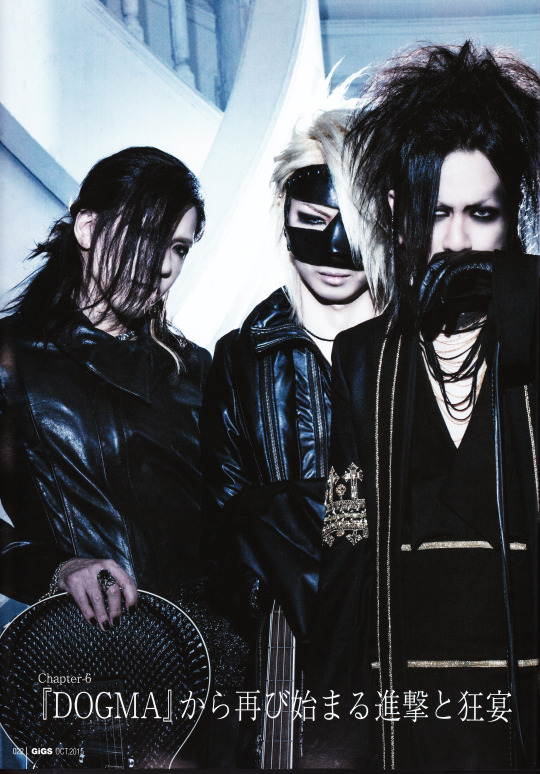
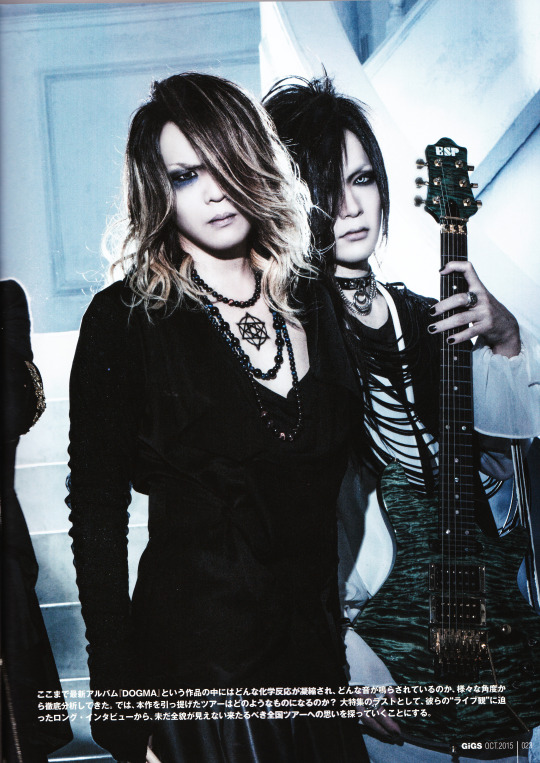
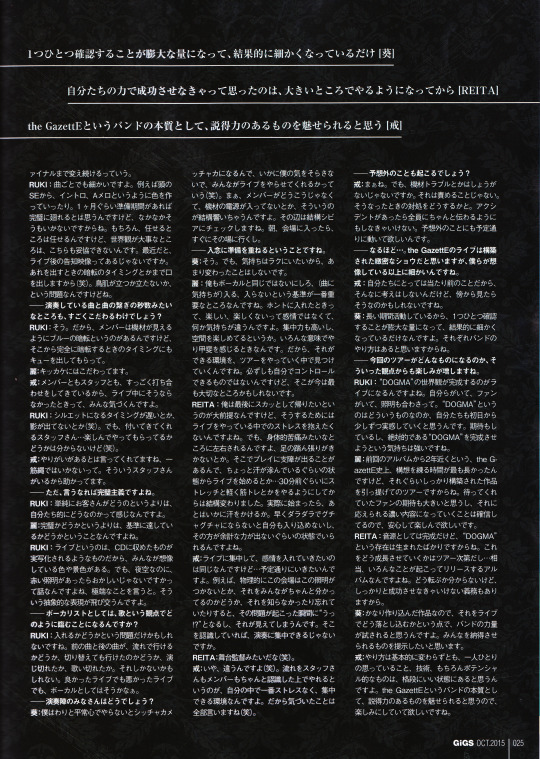
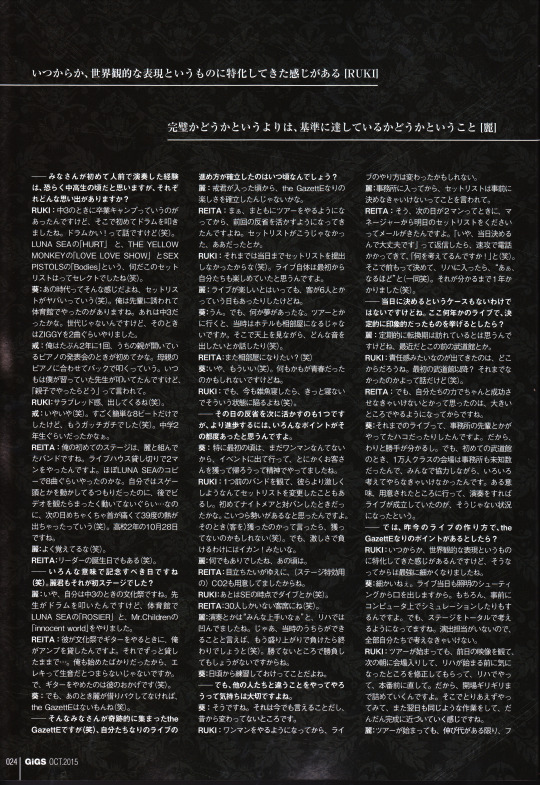
Chapter 6 - The Resurgence and Frenzy Beginning Again with DOGMA
So far, we’ve thoroughly analyzed the chemical reactions and sounds condensed into the latest album, “DOGMA,” from various perspectives. But what will the tour accompanying this work look like? In this in-depth feature, we explore their thoughts on live performances in a long interview, aiming to uncover their sentiments toward the upcoming nationwide tour, the full scope of which is still unknown.
"At some point, we started focusing on expressing a cohesive world view." - Ruki
"It’s not so much about whether it’s perfect, but whether it meets the standard." - Uruha
"We’ve been active for a long time, so the amount of things we need to check has grown to an immense level over time. As a result, it’s become more intricate." - Aoi
"The feeling that we had to succeed on our own really hit when we started performing at larger venues." - Reita
"As the essence of what the GazettE is, we aim to present something truly convincing and powerful." - Kai
Interviewer: Everyone’s first time performing in front of an audience was likely during your middle or high school days. What kind of memories do you have of that experience?
RUKI: It was during a graduation camp in my third year of middle school. That was the first time I played drums. Yes, drums! (laughs) Quite a surprise, right? (laughs). I played HURT by LUNA SEA, LOVE LOVE SHOW by THE YELLOW MONKEY, and Bodies by the SEX PISTOLS. It was such a bizarre setlist (laughs).
Aoi: That era had a lot of wild setlists like that (laughs). For me, I was invited by an upperclassman to perform in the school gym. I think I was in my third year of middle school too. We weren’t exactly of the generation, but we played two ZIGGY songs.
Kai: I think my first time was at a piano recital my parents organized every two years. My mother played piano while I accompanied on drums. Normally, my teacher would play the drums, but they suggested, “Why not do it as a parent-child duo?”
RUKI: That’s giving major prodigy vibes (laughs).
Kai: No, no, nothing like that (laughs). It was just a very simple 8-beat pattern, but I was totally stiff from nerves (laughs). I think I was in my second year of middle school.
REITA: My first performance was with a band I was in with Uruha. We rented out a live house and did a two-band show. We played about eight songs, mostly LUNA SEA covers. I thought I was moving my head a lot during the performance, but when I watched the video later, I was barely moving (laughs). Despite that, my neck hurt like crazy the next day, and I came down with a 39°C fever (laughs). It was October 28th of my second year of high school.
Uruha: You remember the exact date? (laughs).
REITA: It’s also the band leader’s birthday (laughs).
Interviewer: It sounds like that day was memorable in many ways (laughs). Was that also Uruha’s first stage?
Uruha: No, my first was during my middle school culture festival. A teacher played the drums, and we performed LUNA SEA’s “ROSIER” and Mr.Children’s “innocent world” in the gym.
REITA: When he was preparing to play guitar for the cultural festival, I lent him my amp. And then he ended up holding onto it for ages… At that time, I had just started playing too, and you know, electric guitar without an amp isn't very fun. So because of him, I quit playing guitar (laughs).
Aoi: But if Uruha hadn’t stolen that amp back then, there would be no GazettE (laughs).
Interviewer: It’s remarkable how all of you came together in the GazettE (laughs). When did you establish your current approach to live performances?
Uruha: I think it was after Kai joined that we solidified what made the GazettE's shows fun.
REITA: Yeah, once we began doing proper tours, we started reflecting on the previous shows and learning from them. Things like, “That setlist didn’t work,” or “This part could’ve been better.”
RUKI: Before that, we wouldn’t even finalize the setlist until the day of the show (laughs). But even from the beginning, I think we always managed to enjoy the performances ourselves.
Uruha: Even though live shows were fun, there were days when we only had six people in the audience.
Aoi: Yeah, but we had dreams. When we went on tours, we’d share hotel rooms, right? We’d lie on our backs staring at the ceiling, talking about what kind of music we wanted to create (laughs).
REITA: Do you want to go back to sharing rooms? (laughs)
Aoi: Nah, I’m good (laughs). Maybe those days were just all part of our youth.
RUKI: But even now, if we all slept in the same room, we’d probably end up talking all night, about the same kind of stuff (laughs).
Interviewer: Reflecting on each show and applying that to the next one is important, but there must have been specific turning points that helped you all improve further along the way.
Aoi: Especially in the beginning, since we didn’t have solo gigs yet, we’d participate in events with this mindset of, “Let’s win over the audience.”
RUKI: There were times when we’d watch the band before us and decide on the spot to make our setlist more intense. I think that happened the first time we played a show with Nightmare. I remember thinking, “Wow, these guys have so much energy.” Did we win over the crowd that time? Maybe not (laughs). But we weren’t about to lose in terms of intensity!
Uruha: Back then, anything went.
REITA: We even had CO2 effects (stage pyrotechnics) because we just wanted to stand out.
RUKI: We’d start diving into the audience during the intro SE (laughs).
REITA: Into a crowd of 30 people (laughs).
Uruha: When it came to rehearsals, I’d often feel disheartened, thinking, “Wow, everyone else plays so well.” So at that point, the only thing we could do was focus on not losing in terms of energy and excitement (laughs). There was no point in competing in areas where we couldn’t win.
Aoi: That just means you’ve got to practice more on a daily basis.
Interviewer: Still, having that mindset of wanting to do something different from everyone else is important, isn’t it?
Aoi: Definitely. That’s something that’s still true for us, and it hasn’t changed since back then.
RUKI: I think our approach to live performances changed once we started doing one-man shows.
Uruha: When we joined our agency, they told us we needed to finalize the setlist in advance.
REITA: Right, there was this one time before a two-band show when the manager emailed us, asking for the setlist. I replied, “Don’t worry, we’ll decide it on the day,” and immediately got a phone call. The manager was like, “What are you even thinking?!” (laughs). When we finally started deciding the setlist ahead of time and then rehearsed it, we were like, “Ohhh, this makes sense” (everyone laughs). It took us about a year to figure that out (laughs).
Interviewer: Deciding on the day isn’t entirely unheard of, but looking back, were there any particularly memorable performances in recent years?
Uruha: I feel like turning points come to us periodically. Recently, it would have to be our show at Budokan.
RUKI: I wonder when we started to feel a sense of responsibility. Maybe after the first Budokan show? Not that we didn’t have any before that (laughs).
REITA: The realization that we had to succeed through our own abilities really came when we started playing in larger venues.
Aoi: Before that, our shows were often at venues where senior bands from our agency had performed, so we had a pretty good idea of how things worked. But when we first played Budokan, a venue that holds around 10,000 people, it was uncharted territory even for our agency. We had to collaborate and think things through carefully. In a way, up until then, we could simply show up to a pre-prepared venue, play our set, and the show would come together. But that dynamic changed. In a way, we’d been able to just show up, play, and the live would work. But that was no longer the case.
Interviewer: In terms of your recent approach to creating live shows, what would you say is unique to the GazettE’s style?
RUKI: At some point, we started focusing on expressing a cohesive world view. Since then, everything has become insanely detailed.
Aoi: Yeah, it’s super detailed. Even on the day of the show, we’ll weigh in on things like lighting adjustments. Of course, we also use simulations on computers beforehand. But now, we think of the entire stage as a unified production. Since we don’t have a director for staging, we have to handle everything ourselves.
RUKI: Even after the tour starts, we watch footage from the previous night, head to the venue early the next morning, and make adjustments to anything that caught our attention before rehearsals begin. We test those changes during rehearsal, tweak them again before the show, and work right up until just before the doors open. It’s a process of constantly refining things—trying them out, then repeating the same process the next day. Little by little, it gets closer to what we want.
Uruha: Even after the tour starts, as long as there’s room for improvement, there’s a massive amount of things to check, which inevitably makes everything more detailed. We keep making changes all the way up to the final show.
RUKI: We’re particular even with individual songs. For example, from the opening SE, the intro, and into the verse, we create a mood, layer by layer. If we had about a month to prepare, I think we could do everything perfectly, but that’s not usually the case. Of course, we delegate where we can, but when it comes to elements critical to the overall atmosphere, there’s no room for compromise. Recently, there’s the matter of those post-show announcement videos, right? We even get involved in things like the timing of the blackout before those play (laughs). It’s all about whether it gives us goosebumps or not—that’s the deciding factor.
Interviewer: You’re also very particular about details like the number of seconds between songs during a performance, right?
RUKI: Right. So for example, there’s a blue blackout where the members can still see their equipment, but even for the moment when it shifts to complete darkness, we’ll have the crew cue it precisely.
Uruha: We’re very particular about the timing of those cues.
Kai: We have so many discussions with both the band members and the staff that when something doesn’t go as planned during a show, everyone notices.
RUKI: Like if the timing for creating a silhouette is off or the shadow doesn’t appear properly (laughs). But we’re lucky to have a staff that keeps up with all this… Whether they enjoy it or not, I can’t say (laughs).
Kai: They’ve said it’s rewarding, even though it’s not easy. We’re really grateful to have such dedicated staff.
Interviewer: That level of detail could be described as perfectionism, wouldn’t you say?
RUKI: It’s less about what the audience thinks and more about whether it feels right to us.
Uruha: It’s less about being perfect and more about meeting our standards.
RUKI: A live show is like a live-action version of what’s on a CD. Everyone has an image of the colors and scenery they imagine when they listen to the music. If it’s supposed to feel like a night sky, but you have red lights, that doesn’t make sense. It’s that kind of abstract balance we’re always working with.
Interviewer: As a vocalist, what’s your approach to these live performances?
RUKI: It’s about whether I can immerse myself in it. Whether the transition from the previous song to the next flows naturally, whether I can switch seamlessly, whether I can fully embody and perform the song, and whether I can sing it completely. That’s all it comes down to for me, whether the live went well or not.
Interviewer: How about the instrumental members?
Aoi: I need to stay calm; otherwise, things get completely chaotic for me. It’s about how much everyone helps me stay focused during the live performance (laughs). It’s not about the members—it’s more about technical issues, like equipment power not being on. Those things really affect me, so I check those details pretty rigorously. The moment I arrive at the venue in the morning, I head straight to my gear to make sure everything’s in order.
Interviewer: So thorough preparation is key.
Aoi: Definitely. But I also want to keep things mentally light, so I try not to change too much from my usual routine.
Uruha: I’m somewhat similar to RUKI in that my focus is whether I can fully immerse myself in the music. When I’m fully in it, it’s not about whether I’m having fun or not—it’s more that my feelings are on a completely different level. My concentration is higher, and I feel like I’m truly experiencing the zone. Those are the moments when I feel a real sense of fulfillment. During a tour, it’s about discovering an environment that allows for that kind of immersion. It’s not something I can always control myself, but right now, that’s what I value most.
REITA: For me, the ultimate goal is to walk away feeling refreshed, but to get there, I want to avoid any stress during the performance. Physical discomfort tends to have the biggest impact—things like not being able to plant my feet properly can throw me off. To address that, I started warming up about 30 minutes before the show—stretching and light muscle training. It’s made a big difference. Once the performance starts, it’s all about how much I can sweat. If I don’t get drenched and completely messy early on, I can’t fully immerse myself. Being in that state keeps me from overexerting myself unnecessarily.
Kai: Like everyone else, I want to fully focus on the performance and channel my emotions into it. But at the same time, I want things to go as planned. For instance, if there’s a venue where certain lighting isn’t available, I need to know that everyone—both the staff and the band members—understands this limitation. If someone doesn’t know or forgets, the moment something unexpected happens, it’s like, “Whoa, what just happened!?” That moment of confusion becomes visible. If everyone’s on the same page, I can focus entirely on the performance.
REITA: You sound like a stage manager (laughs).
Kai: No, no, it’s not like that (laughs). But when the flow of the show is clearly recognized by everyone—staff and band alike—that’s when I can feel the least stressed and the most focused. That’s why I speak up about anything I notice (laughs).
Interviewer: But unexpected things still happen, don’t they?
Kai: Sure, they do. But things like equipment trouble, you can’t really help that. It’s not something to blame anyone for. The important part is how we respond when it happens. We also have to make sure that any accidents are communicated clearly to everyone. Even when something unexpected happens, we want things to proceed as smoothly as planned.
Interviewer: I see... The GazettE’s live shows feel like intricately crafted spectacles. But it sounds like they’re even more detailed than we might imagine.
Kai: To us, this level of detail feels normal, so we don’t really think about it. But maybe it seems that way to others.
Aoi: We’ve been active for a long time, so the amount of things we need to check has grown to an immense level over time. As a result, it’s become more intricate. But every band has its own way of doing things.
Interviewer: This tour sounds like it’s going to be something truly special, even from this perspective.
RUKI: The worldview of DOGMA will only fully come together during the live performances. With us, the fans, and the lighting all coming together, that’s when the true essence of DOGMA emerges. I think we’ll start to feel what DOGMA really is little by little from the first day. I’m excited about it, and we’re very determined to bring this absolute of DOGMA to completion.
Uruha: This time, we had nearly two years of preparation since the last album, the longest planning period in The GazettE’s history. It’s a meticulously constructed work that we’re bringing on tour. The fans who’ve been waiting for us have high expectations, and I’m confident that the tour will be rich and fulfilling enough to meet those expectations. I want them to enjoy it without any worries.
REITA: The album itself is complete, but the entity of DOGMA has just been born. How it grows will depend on the tour. This album was created under intense circumstances, with so many things happening during its production. We don’t know how it will evolve, but we feel a strong obligation to make it a success.
Aoi: It’s such a well-constructed work that I think our abilities as a band will be put to the test in how we translate it into a live performance. We’re determined to present something that everyone will be satisfied with.
Kai: While our approach hasn’t fundamentally changed, I feel that what each of us brings—our ideas, skills, and overall potential—is at its highest level ever. As the essence of what the GazettE is, we aim to present something truly convincing and powerful. I want everyone to look forward to that.
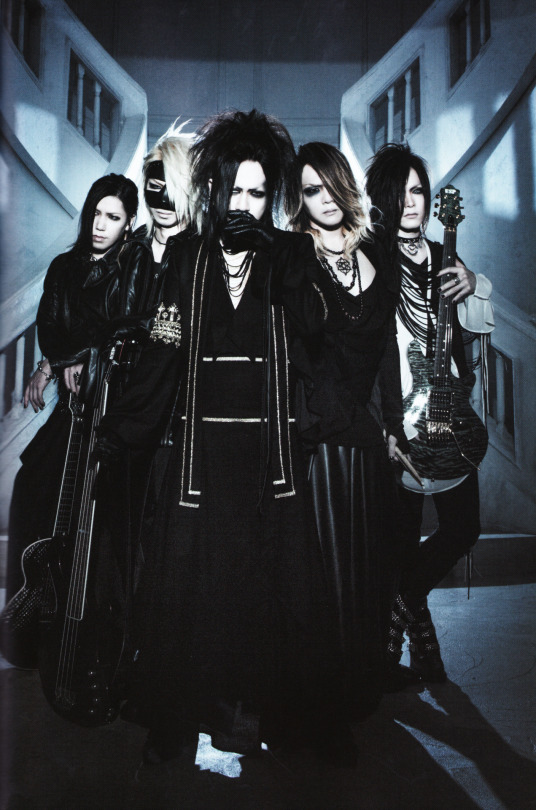
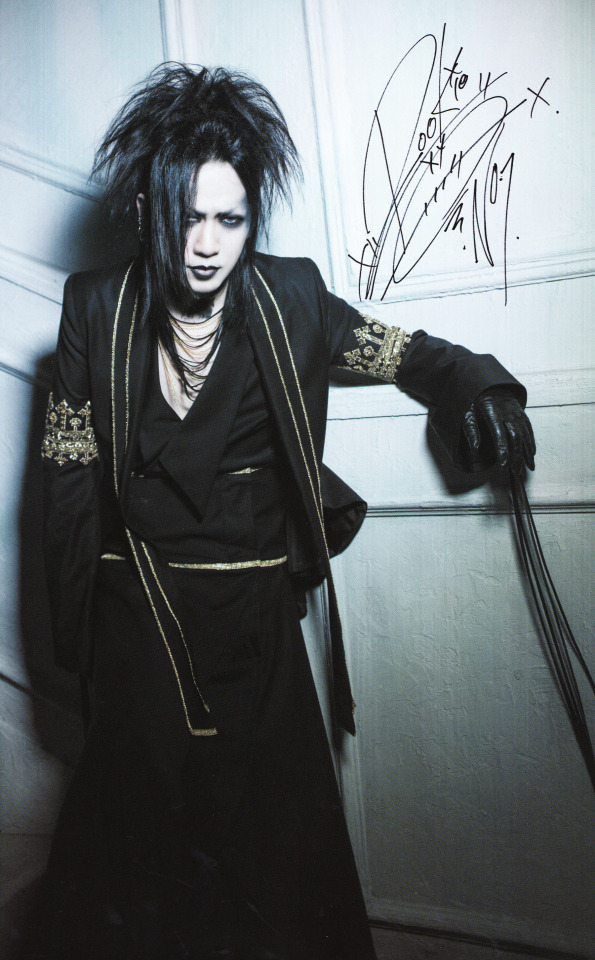
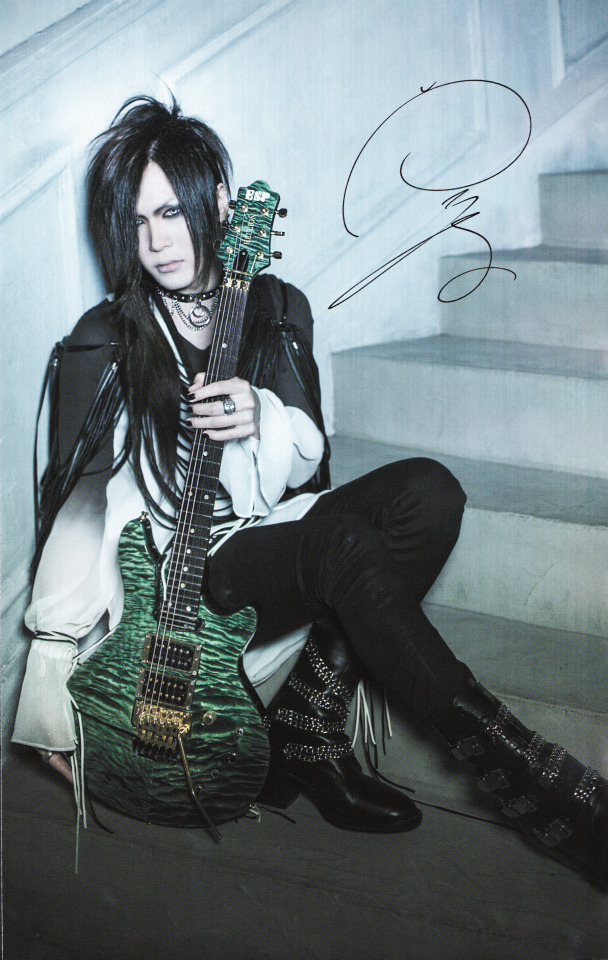
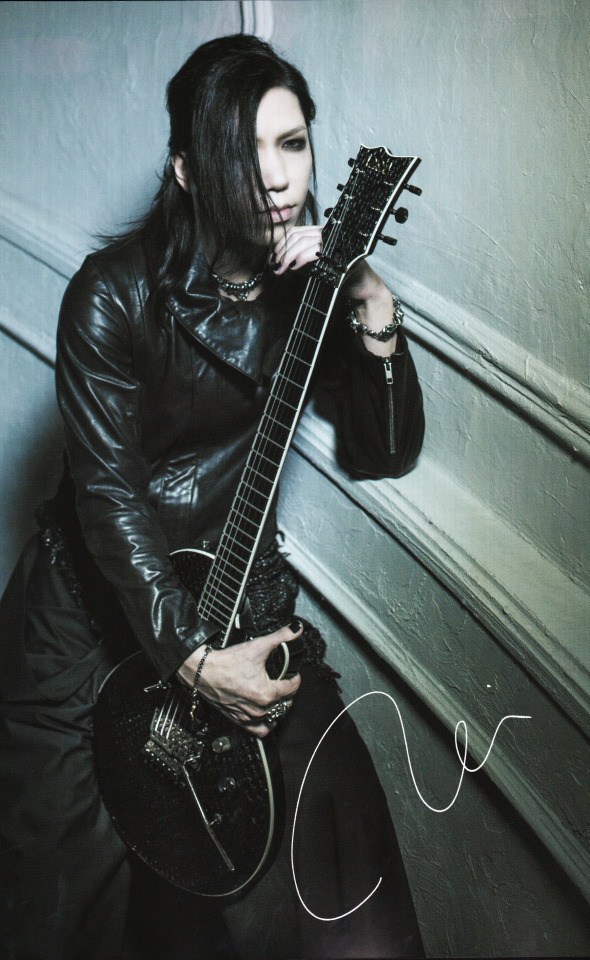
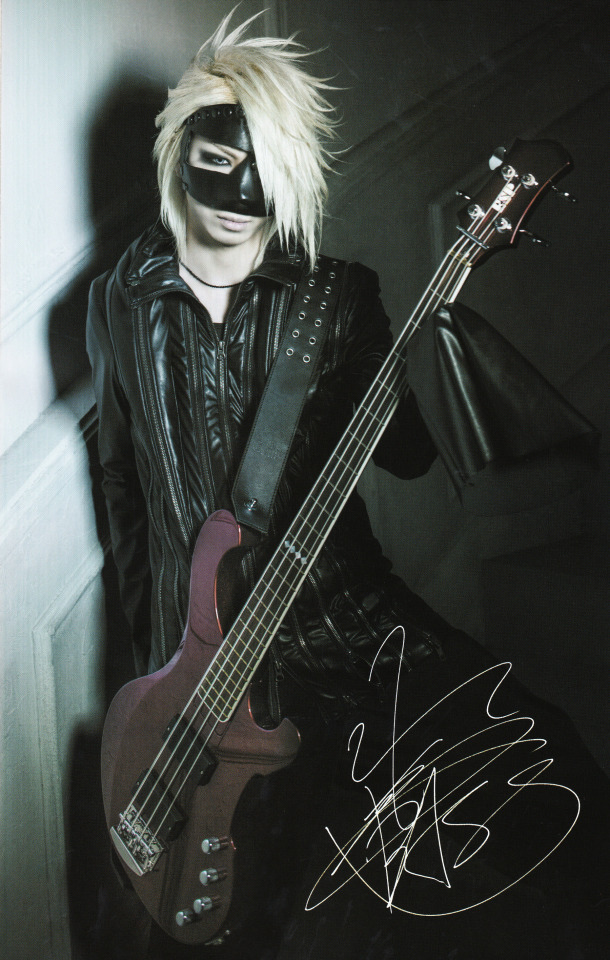
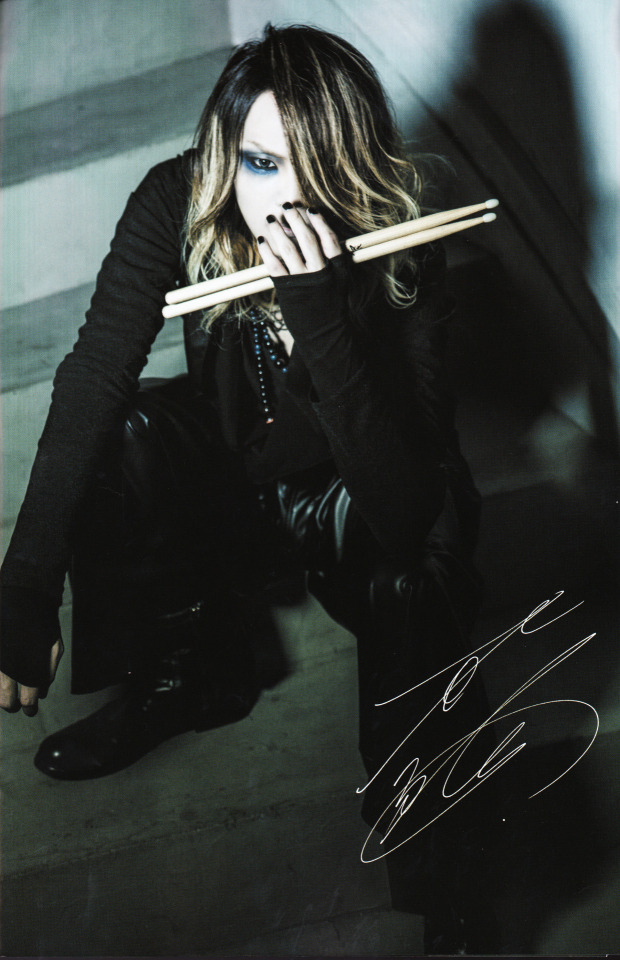
Scans cr: Kyoselflove Translation: ChatGPT
#this isnt the 1 i quoted few days ago btw. and it prob wont be the next 1 i post either...#but i ll get to it.. before the year ends i guess?#the gazette#interview translations#gigs#scans#magazines#dogmatic#mi#uruha not mentioning sugizo in an interview challenge (impossible)
29 notes
·
View notes
Text
Welcome To My Blog ♡



I’m Astara / I’m 22 years old / She/Her / Lesbian / I write Marvel fics / I am neurodivergent and struggle with dyslexia.
See my masterlist and request info bellow<3
—————————————————————————
MASTERLIST:
Natasha Romanoff
Mommy’s got you now (Mom!Natasha x Daughter!Reader)
Fireworks (Natasha x Reader)
Tiny Dancer Series (Mom!Natasha x Daughter!Reader)
Babble (Mom!Natasha x Daughter!Reader)
The Ice Cream Is Too Hot (Natasha x Autistic!Reader
We Saved Each Other Series (Natasha x Kid!Reader)
Autumn Air (Natasha x Autistic!Reader)
7 Laps Round The Sun (Mom!Natasha x Daughter!Reader)
Sleepy Bear (Natasha x Reader)
I’m Not Pinocchio (Natasha x Reader)
Christmas Lies (Mom!Natasha x Daughter!Reader)
Three In The Bed (WandaNat x Teen!Reader)
Baby Bear (Natasha x Sick!Reader)
Mama Bear Mode (Natasha x Teen!Reader)
We Can Try (WandaNat x Teen!Reader)
Missing In Action (WandaNat x Reader)
Press (Natasha x Daughter!Reader)
First Moments (WandaNat x Daughter!Reader)
Send Out An Army (Natasha x Daughter!Reader)
For You (WandaNat x Daughter!Reader)
Birthday Girl (Natasha x Daughter!Reader)
Girl In The Park (Natasha x Teen!Reader)
Tiger-Lilly (Natasha x Daughter!Reader)
Red Hair, Green Eyes (Natasha x Teen!Reader)
Tasha’s Got You (Natasha x Autistic!Reader)
Secrets & Lies (Mom!Natasha x Daughter!Reader)
Under Their Gaze (BlackHill x Daughter!Reader)
Accidents Happen (WandaNat x Daughter!Reader)
Little Prankster (BlackHill x Daughter!Reader)
Terrible Twos (Mom!Natashax Daughter!Reader)
Stuffies (Kid!Reader x Natasha)
All I Want For Christmas (Kate!Natasha!Maria x Reader)
Happy House 1 | 2 | 3 (Natasha x Reader)
Kate Bishop
Best Friend Crush (Kate x Reader)
Little Devil (Kate!Yelena x Daughter!Reader)
The Protective Archer (Kate x Sister!Reader)
All I Want For Christmas (Kate!Natasha!Maria x Reader)
Yelena Belova
Little Devil (Kate!Yelena x Daughter!Reader)
Little Miss American Pie (Yelena x Daughter!Reader)
Wanda Maximoff
Three In The Bed (WandaNat x Teen!Reader)
We Can Try (WandaNat x Teen!Reader)
Missing In Action (WandaNat x Reader)
First Moments (WandaNat x Daughter!Reader)
For You (WandaNat x Daughter!Reader)
Accidents Happen (WandaNat x Daughter!Reader)
Scarlett Johansson
Math Test (Mom!Scarlett x Daughter!Reader)
Mine All Mine (Mom!Scarlett x Daughter!Reader)
Mamas Girl (Mom!Scarlett x Daughter!Reader
Safe With Her (Scarlett x Teen!Reader)
Paparazzi (Mom!Scarlett x Daughter!Reader
The Dance Recital (Mom!Scarlett x Daughter!Reader)
Forgotten (ScarLizzie x Daughter!Reader)
420 (Scarlett x Daughter!Reader)
Scarlett’s Here (Scarlett x Autistic!Reader)
Angel Wings (Scarlett x Daughter!Reader)
Another Mother Series (Colin!Scarlett x Reader)
Copy Cat (Scarlett x Daughter!Reader)
The First Day (Scarlett x Daughter!Reader)
Influenced (Scarlett x Daughter!Reader)
4 Inches Taller (Scarlett x Daughter!Reader)
The Favourite Child (ScarLizziex Daughter!Reader)
Healing Is Never Linear (Scarlett x Daughter!Reader)
Broken Hearted (Scarlett x Daughter!Reader)
Guinea Pig (Scarlett x Daughter!Reader)
Far Apart, but Close In Heart (Colin!Scarlett x Daughter!Reader
Fears (Scarlett x Daughter!Reader)
Dads And Fathers (Colin!Scarlett x Daughter!Reader)
No Matter What (Scarlett x Daughter!Reader
Always My Baby (Scarlett x Daughter!Reader)
Elizabeth Olsen
Forgotten (ScarLizzie x Daughter!Reader)
The Favourite Child (ScarLizziex Daughter!Reader)
Colin Jost
Another Mother Series (Colin!Scarlett x Reader)
Far Apart, but Close In Heart (Colin!Scarlett x Daughter!Reader
Dads And Fathers (Colin!Scarlett x Daughter!Reader)
Clint Barton
Birthday Cake (Clint x NatsDaughter!Reader)
Hoodie (Clint x NatsDaughter!Reader)
Maria Hill
Under Their Gaze (BlackHill x Daughter!Reader)
Little Prankster (BlackHill x Daughter!Reader)
All I Want For Christmas (Kate!Natasha!Maria x Reader)
—————————————————————————
REQUEST INFO:
Who I write for
Natasha Romanoff / Scarlett Johansson / Elizabeth Olsen / Clint Barton / Yelena Belova / Wanda Maximoff / Steve Rogers / Kate Bishop / Tony Stark / Pepper Potts / Morgan Stark / Colin Jost / YN x characters listed /
What I write
Female reader only / fluff / angst / hurt / comfort / mentions of smut / little/kid reader(non sexual) /mental health / Neurodivergent reader /
What I don’t write
Male reader / detailed smut / homophobia / pedophiloa
—————————————————————————
If I haven’t mentioned anything you had in mind feel free to request it! If I find anything uncomfortable I’ll inbox you privately🤍
—————————————————————————
My requests/asks are ALWAYS open, you can also PM me about anything! This is a safe place for EVERYONE!
- Astara🩷
—————————————————————————

#marvel fic#marvel#writers on tumblr#fanfic#mcu fandom#x yn#natasha romanoff#natasha x daughter!reader#black widow#avengers#nat x reader#natasha x little!reader#natasha romanoff x reader
323 notes
·
View notes
Text
Events Leading to Stonewall
In honor of the Stonewall riots' anniversary I'd like to take a minute to talk about what led up to them.
The Stonewall riots, taking place June 28th, 1969, were a series of riots that started at the Stonewall Inn between police and LGBTQ+ protestors. The events leading up to them are just as important as their impact on today so a few of these events will be discussed in this post. Obviously I cannot cover them all but I plan on talking about more in their own posts.
After WW2 many Americans began efforts to restore the country to it's pre-war state and prevent change from occurring in the social order. During this time any groups considered "um-american" were deemed security risks, among these groups were gay men and lesbians. The reasoning behind this was that, according to the US State Department, they were deemed susceptible to blackmail. According to a report chaired by Clyde R. Hoey: "It is generally believed that those who engage in overt acts of perversion lack the emotional stability of normal persons" These actions led to 1,700 federal job applications being denied, 4,380 people being discharged from the military, and 420 individuals being fired from federal jobs, all due to suspicions of homosexuality.
In 1952 homosexuality was listed in the DSM as a mental disorder by the American Psychiatric Association. The reasoning behind this choice was a belief that homosexuality stems from an unreasonable fear of the opposite sex. Despite numerous studies contradicting this belief, including those of Evelyn Hooker, the APA did not remove homosexuality from the DSM until 1974. The lasting damage of this decision can be seen even today with many queer people still being seen as mentally ill for their identity.
The Hays code was originally implemented in 1934, also being known as the Motion Picture Production Code. Created by a Catholic man named Martin Quigley in 1929 the purpose of the Hays code was to enforce "morals" in the film industry in order to not badly influence american citizens, particularly children. Some examples of Inclusions prohibited by the Hays code include: Profanity, ridicule of the clergy and seuxla perversion (including homosexuality). The frustration regarding these rules could be felt at the time within the queer community and even today with tropes like queer-coded villains.
I hope this post helped to provide some context surrounding the events that kickstarted the Stonewall riots. Looking back at these events gives us both context for how far we've come aswell as how far we still need to go.
#queer history#historian#history#history facts#queer#lgbtq#lgbt#lgbtqia#lgbtq community#pride#pride month#stonewall#stonewall inn#stonewall riots#stonewall anniversary
48 notes
·
View notes
Photo
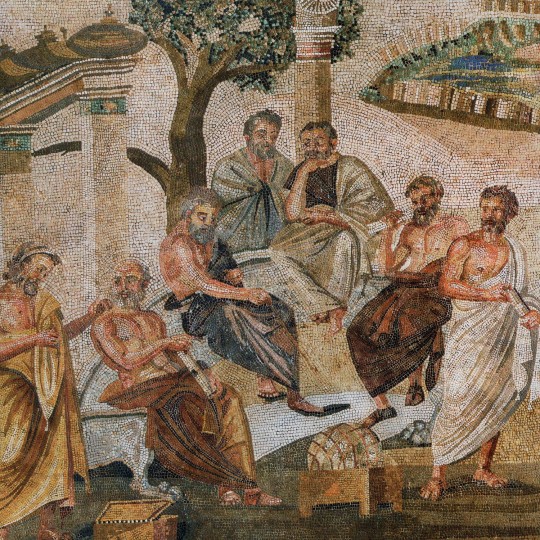
Roman Students in Athens
Training in oratory was a crucial part of Roman education; it was associated with a young boy's transition into adult life. As Athens was considered the intellectual centre of the eastern Mediterranean, many students undertook long journeys so that they could attend the best-known specialised rhetorical schools or study at one of several established philosophy centres.
Roman Education
Education was seen by the Romans as crucial to self-advancement. For young upper-class boys, it was key to obtaining an important position in ancient Roman society. Girls from the well-to-do and elite circles tended to be married at a very young age and did not formally advance their studies, although they may have received a sophisticated education from private tutors.
Originally, training in oratory was not provided within a school context but carried out under the tutelage of a famous statesman who would prepare his young pupil for a political career in the Roman government. However, by the 2nd century BCE, Greek culture had a significant influence on the Roman Republic, and the traditional approach made way for the Greek education system. In Greece, specialised teaching centres had existed for centuries, and gradually, schools of oratory became established in Rome, too. Ancient philosophy was divided into three areas; ethics, physics, and logic; pupils wishing to study philosophy could attend centres offering studies in Greek on doctrines such as Epicureanism and Stoicism. Alternatively, the young Roman boy could leave home to study abroad.
Some modern scholars have referred to this period in a young person's life as going to 'university'. However, the word is used loosely as there was no official curriculum and no official degrees. Nevertheless, going to 'university' in ancient times did entail not only advancing one's studies but also leaving one's family for a new environment and lifestyle in which a student could become a part of the culture of a famous intellectual centre.
During the Republic, notable figures were amongst those who travelled abroad for educational purposes including Julius Caesar (c. 100-44 BCE), the politician Marcus Junius Brutus (85-42 BCE) the orator Cicero (106-43 BCE), poet and satirist Horace (65-8 BCE), and son of Cicero. Generations later, we have the writings and correspondences of former students like the Latin rhetorician Aulus Gellius (123-165 CE), the Greek sophist and rhetorician Libanius (314-393 CE), and the Greek sophist, Eunapius (c. 345 to c. 420 CE), who provide valuable insights through their own experiences of studying in Athens.
Continue reading...
39 notes
·
View notes
Note
Pac smoking/vaping, and Tubbo getting intrigued. ✨Shotgunning✨
wait guys this is exactly 420 words long 😭 weed win i guess
Pac knew for sure that he had some nasty habits that followed him from prison. The tense undercurrent of coparenting with the man who ate his leg was definitely one of the biggest ones. But in his own personal opinion, and Mike's, the smoking was the worst.
Smoking was relaxing. Even though it did tend to remind him of nights spent behind bars with Cell's voice ringing in his head and Mike looking disapprovingly at him.
Realistically he knew the gray smoke was horrid for his lungs but the drag and burn of nicotine and swirls in the sky was addictive. The smell clung to him now as he pulled the cigarette away from his chapped lips. It was night on the island, dark clouds high above with the silver moon shining between them. The cold metal of the house roof chilled him through his jeans.
“What are you doing?” came a voice.
Pac turned his head halfway to see the half illuminated figure of Tubbo behind him. “Smoking. Wanna join?”
“That stuff kills your lungs you know,” Tubbo sniped but he sat down next to him anyway.
Pac huffed out a laugh. “You sound like Mikey now. Sim, I know it's killing my lungs.”
Tubbo snorted. “Your funeral, man.”
“Oh c'mon you've never wondered?” Pac said, nudging him in the arm. Between two fingers, he held out the cigarette half heartedly.
Tubbo shifted in place, turning his body to fully face Pac. “You are being a bad influence on me right now.”
Pac laughed, shifting his body in sync so he and Tubbo were face to face. “Me? A bad influence? Neverrrr.”
Tubbo rolled his eyes and grabbed the cigarette out of Pac's fingers, easily crushing it against the cold roof.
“Heyyy,” Pac complained, taking the cig back. Out of his pocket, he pulled his lighter, relighting the cigarette with ease from the other side. “Let's do this the fun way yeah?”
Tubbo raised an eyebrow at him. “The fun way?”
Pac laughed and raised the cigarette to his lips. He took a long drag before sliding his hand along Tubbo's jaw to tilt their faces together. Tubbo leaned in easily, opening his mouth ever so slightly so Pac could breathe against it, brushing their lips together.
Tubbo sucked in, their breath mingled together. So warm in an incredibly cold moment, the chilling night air warded off by the warmth shared between them.
“Yeah,” Tubbo said in a strained voice when they finally pulled apart. “That's the fun way.”
#pacbo#qsmp#my writing#fanfiction#q!tubbo#q!pac#qsmp shipping#haha weed number#anyway#shotgunning my beloved
37 notes
·
View notes
Text
Hello everyone! I am back on my overanalyzing bullshit with the third installment of my episode-by-episode analysis of Bridgerton’s season 3 Classical music soundtrack!
Here is the very short playlist of Classical pieces used in episode 3, in the order they appear in the show:
Schubert’s String Quartet No. 13 in A Minor, D 804, Op. 29, No. 1 “Rosamunde”: IV. Allegro moderato
Mozart’s String Quartet No. 15 in D Minor, K. 420: I. Allegro moderato
Joseph Lanner’s Abendstern Walzer in G Major, Op. 180
But rest assured, the relatively small number of pieces used in this episode has not stopped me from reading too much into things! And I have decided that this episode and its soundtrack are all about desire, and the game we play with ourselves trying to cover up our desires with decorum. And that starts with the piece that plays as Benedict and Tilley introduce themselves to each other at the Innovations Ball, the fourth movement of Schubert’s String Quartet No. 13.

When I first started reading about this movement, I initially latched onto something a couple articles mentioned about the influence of folk music on this piece. Apparently Schubert’s usage of grace notes in this movement is reminiscent of traditional Hungarian or Andalusian music—specifically Romani music—and because the piece plays during this flirtatious romantic encounter, I thought maybe there’s something here about the exotic appeal of the music mirroring the exotic appeal of the surprising Lady Arnold.
But the more I listened to the music, the more I started to notice something completely different. Something a bit more primal. This piece of music? Sounds like breathing.
There’s something about the jerky rhythm and close harmonies of the opening lines—a motif that’s repeated throughout the piece—that brings to mind the back-and-forth inhale-exhale of discordant harmonica playing, or the labored heaving of a bellows. There are other moments of sharply syncopated rhythms, especially those where the musical line jumps upward suddenly in pitch, that sound like stuttered gasps. Right in the middle of the piece, the opening theme repeats, but not until after a couple false starts, as if we’re stopping every few measures to catch our breath. And I can’t help but think of Colin shooting out of his bed after his dream of ravishing Penelope, panting. Or Penelope practically hyperventilating after nearly getting run down by the hot air balloon because she’s too distracted looking at Colin’s arms. Or the two of them, gaping at each other open-mouthed and speechless after Colin approaches her at the ball.
This episode plays around with the idea of our “innate animal impulse” and “the battle between man and nature,” as Lady Whistledown so eloquently puts it, in several ways…
There is, of course, Colin’s carnal and involuntary dream, which he tries unsuccessfully to repress. And Penelope’s paralyzing lust that ends up quite literally putting her in direct confrontation with man’s innovation. Then there’s Debling himself, othered by his peers for rejecting what the rest of society thinks of as a natural instinct to eat meat. Even the Feathington side plot has an element of this theme, with Varley and Portia attempting to use a potion to impose their will (man) onto the sex of Prudence and Philippa’s babies (nature).
But let’s revisit Benedict and Tilley for a moment. As they are formally introduced to one another, Schubert’s heaving breath of a quartet plays in the background, and it is during this scene that a clear mutual attraction is established. In fact, Tilley admits openly that her attraction to Benedict is rooted in something rather base and animalistic: watching Benedict while he, as he puts it, “tugged on a rope.” Immediately after this scene, we get another very interesting dichotomy and source of tension about what is “natural”: during Benedict and Tilley’s dance scene, Tilley turns Benedict around, reversing them so that she’s in the leading position. It’s clear Benedict is a little befuddled by this at first, but after a moment he smiles and allows himself to give in to the moment and to his desire. Which is, of course, just the beginning of Benedict opening up to his desires in all sorts of other ways as the season progresses. Compare this to Colin who despite being extremely desirous of Penelope at this moment is still holding himself back. (And similarly with Penelope, also clearly desirous of Colin but still convincing herself that she needs to seek a practical match elsewhere.) In the battle between man and nature, Benedict has let nature win; Colin is still embroiled in conflict.
The Benedict-Tilley dance scene transitions then to Will Mondrich and his bar. This is only a short interlude, but it’s yet another example of this battle playing out—the Mondriches, thinking they have the freedom to do whatever they want, to do what comes naturally to them, but finding that they are still bound by societal obligations that feel anything but. It’s also the scene where the next piece on our playlist, the first movement of Mozart’s String Quartet No. 15, is introduced. It starts while Will is being told that “everything has limits” and carries us into the next scene, which I think is a really cool musically narrative way to connect the Mondriches’ conflict around desire to Colin’s. Because what’s the next scene, during which our Mozart quartet features prominently? Colin’s bravery speech.
I absolutely love the use of this Mozart quartet for this scene. The music itself is dark, it’s dramatic. Full of heavy chromaticism (usage of notes that do not occur naturally in the key), falling octaves and semitones (which sound a bit like plaintive wailing), and pulsing repeated eighth notes (like a quickened heartbeat), one reviewer described this piece as being “perhaps the most intense quartet in general before Beethoven.” Like the earlier Schubert string quartet, this piece is in a minor key, but unlike the Schubert, Mozart’s is one of only two of his twenty-three string quartets written in minor, which I think emphasizes the purposefulness of this selection. And the broodiness of the music underscores the moment perfectly…
Colin is surrounded by ladies who are all fawning over his heroics with the hot air balloon earlier that day, but he’s thinking only of Penelope. Yet he cannot go to her. Decorum demands it. Penelope herself asked for distance. But he’s unable to resist completely. Mid-conversation with the other ladies, he seeks her out in the crowd, drawn inexorably and irrevocably to her, and when at last he finds her, their eyes meet across the room. Sound muffles, hearts pound. He wants her. He pulled on that damn rope for her. And yet she is one of the only women in the entire room not following him around like a feral groupie. Not only that, but after his little speech, which is also essentially for her benefit, she turns away from him. And worst of all, she’s turning away from him to go to another man! Cue the plaintive wailing.
As soon as Penelope leaves, Colin can no longer stand to engage in social posturing, and he excuses himself. The quartet ends as Penelope approaches Debling, and then we get a very raw, honest, and brave confession from Penelope about her true self. Notably, this speech is accompanied in the background only by the low murmuring chatter of the other guests at the ball—no music. Until Debling says, “I do not wish to court someone exactly like myself,” at which point the last piece on our playlist, Lanner’s Abendstern Walzer (which translates to “Evening Star Waltz”), begins to play.
Musically, one thing I find interesting about the use of this piece along with the other two on episode 3’s playlist is the prevalent use of grace notes throughout the melody. Earlier I mentioned the “exotic” use of grace notes in the first piece, the Schubert string quartet; and although the Mozart quartet doesn’t make use of grace notes quite the same way, the usage of trills is constant. In trying to tie all these pieces to an overall theme of visceral desire, I've likened these musical ornamentations to a fluttering pulse. (Anyone else out there get heart palpitations? 😅) And I think this fits especially well given that the non-musical audio track is already playing around with heartbeats during Colin’s bravery speech.
But another thing I like about the use of the Abendstern Walzer here is simply that it’s a waltz. There’s only one other waltz on the season 3 soundtrack, in episode 6; otherwise the Classical soundtrack is made up primarily of string quartets. What makes the usage of a waltz so interesting? Well, much as it might seem like a kind of stuffy old-fashioned genre of dance nowadays, during the Regency period, the dance was regarded by many in high society as quite scandalous (something I actually first learned from @constitutionalweasleymonarchy 's fabulous Harry Potter Regency AU The Pride of Burrough House!) due to the closeness of the pose (holding each other by the waist?? *gasp*!!).

Now, we’ve seen a lot of close dancing positions throughout the Bridgerton series, so I don’t think the dance itself is actually seen as indecent in this universe, but I do still like the idea of the waltz as a symbol of intimacy (and perhaps a bit of forbidden intimacy, at that). Especially because we hear it in a moment of growing intimacy for Debling and Penelope and Colin and Penelope.
For Debling and Penelope, this moment is an explicit shift in their relationship—it’s clear now that Debling intends to court Penelope exclusively. The music starts up the moment he mentions courting, and plays as he hands the lemonade intended for Cressida to Penelope instead, the two of them looking smilingly into each other's eyes while they drink.
For Colin and Penelope, this moment also marks an explicit shift—it’s the moment Colin has finally accepted that he wants more out of his relationship with Penelope. He’s been desperately desiring Penelope throughout the entire episode, but this moment is when he finally decides that he actually wants to do something about it. The waltz plays throughout his conversation with Violet about friendship being the foundation for great love, and ends abruptly after Violet says, “Because he gathered the courage to ask.”
And yet, even as Colin appears to gather his courage, he still cannot take his own advice to be honest about his feelings and “do anything.” Even though he approaches Penelope head on, there’s still something in his way that causes him to hesitate. At first it’s something internal—whether he’s just too distracted by Penelope’s mouth to get the words out or there’s some lingering fear of rejection—and then it’s very much external, in the form of Debling taking Penelope’s hand to dance. Earlier I wrote: “In the battle between man and nature, Benedict has let nature win; Colin is still embroiled in conflict.” And we see that clearly in this moment. He ultimately lets some amount of pride and/or decorum get in his way. Much as one might declare the waltz forbidden in their dance hall because it’s too risque for polite society.
Thankfully, by the next episode, silly things like honoring proper social etiquette are no longer going to get in Colin’s way. 😉
Before I close out, I want to take a moment to appreciate what an abundant musical feast we get in just the last eight minutes of this episode. At the 43m mark, the Mozart quartet begins. Shortly after that piece ends, we get the Lanner Abendstern Walzer. Almost immediately after that piece ends, we have season 1 throwback “Call Me Simon” playing in the background as Colin approaches Penelope and Lady Whistledown’s voiceover about man vs. nature begins (which I also really, really love as a musical choice and wrote about here). This then fades directly into the Vitamin String Quartet cover of Billie Eilish’s “Happier Than Ever” while Colin tearfully watches the love of his life dancing with another man (and, I may be wrong because I don’t know nearly enough about dance, but I think Penelope and Debling are actually dancing a waltz?? Someone who knows more than I do please let me know, though!), carrying us straight through to the devastating end credits smack at the 51m mark.
It’s just…*chef’s kiss*! What a way to use music to tell a story. I’m obsessed with these last few moments of episode 3—this has definitely been one of my favorite installments in this analysis series (the other one I’m really super looking forward to writing is episode 7; I can’t wait) and I hope you enjoyed it, as well!
♥
Research for this post!
Schubert’s String Quartet No. 13: https://www.earsense.org/chamber-music/Franz-Schubert-String-Quartet-No-13-in-a-minor-Op-29-No-1-D-804-Rosamunde/
Schubert's String Quartet No. 13: https://www.allmusic.com/composition/string-quartet-no-13-in-a-minor-rosamunde-d-804-op-29-mc0002395237
Schubert's String Quartet No. 13: https://www.hyperion-records.co.uk/dw.asp?dc=W8413_67585
Schubert's String Quartet No. 13: https://www.hyperion-records.co.uk/dw.asp?dc=W1644_GBAJY1301017
Mozart's String Quartet No. 15: https://higherrevelations.wordpress.com/2011/09/07/endless-cycle-an-analysis-of-mozarts-string-quartet-no-15-in-d-minor-k421/
Mozart's String Quartet No. 15: https://www.earsense.org/chamber-music/Wolfgang-Amadeus-Mozart-String-Quartet-No-15-in-d-minor-Op-10-No-2-K-421/
Lanner's Abendstern Walzer: https://www.naxos.com/CatalogueDetail/?id=8.573552
Lanner's Abendstern Walzer: http://unravelingmusicalmyths.blogspot.com/2018/02/joseph-lanner-und-der-walzer-key-that.html
#bridgerton#polin#bridgerton season 3#penelope featherington#colin bridgerton#bridgerton analysis#meta#polin songs
15 notes
·
View notes
Text
MHA 420 Spoilers
How it feels to ignore Half the fandom arguing about the chapter and whether it’s good or not and taking Izukus words at face value, even though they’re quoting words from the unofficial translation before the chapter came out which makes the arguments null and void, and bashing on ships/characters surviving the war and simply enjoy the approaching end of a series you’ve grown to love while watching the remaining characters/kids that are the main cast work through their trauma together as their actions influence the steps to creating a better world/society.


#blackdagger 456#my hero academia#boku no hero academia#mha#bnha#midoriya izuku#mha spoilers#bnha spoilers#mha 429#bnha 429#uraraka ochako#ochaco uraraka#ida tenya#deku#uravity#ingenium
24 notes
·
View notes
Note
Hihi I wanted to know what periods of time the demons are from? S3 so far is amazing btw ❤️
It definitely varies from character to character. Valentin and Acylia I admit are from ambiguously the early 1840s (?), but admittedly their designs don't do a GREAT job reflecting that since they're actually a friend and mine's old TF2 OCs that we shipped together LOL. But in my heart, BECAUSE they've been there for so long, they've just straight up changed their fashions to be a bit more modern bc they're both a touch vain. Same with Yuwei.
Laz is (I think it's obvious at this point, or I'd hope so) from the 1930s.
Yuwei I did a decent amount of research for when I was first working on her bc she's supposed to be influenced from a specific figure in Chinese history, and that being aid I believe I modeled her initial clothing when she was human off of 420 AD China so quite loose robes (albeit again, she has updated her outfit to be more modern, but in flashback panels she's obviously wearing more period-accurate clothing)

31 notes
·
View notes
Note
Would you mind sharing your views on backpacking? 👀
Take all of this with a grain of salt because I'm mostly just bothered by backpacking content on Instagram.
I think the concept is fine. I'd actually like to do some backpacking some time.
But backpacking content, as well as most overland* content, always has a really weird vibe. It almost feels like cosplaying poverty if you know what I mean??
It's almost always young people from the so called "West" and almost always they're somewhere in South or Southeast Asia. The most popular backpacking destinations I'm seeing at the moment are Bali (exclusively that part of Indonesia for some reason), Thailand, Vietnam and Sri Lanka. The algorithm has recently also started showing me content from Pakistan, India and Afghanistan.
Since flights to these destinations are usually quite expensive, and many of these people stay abroad long enough that they might need a visa and that accommodation and food would also add up, it can be safely assumed these people have a certain amount of financial stability. Some of them are full time influencers too.
And while travelling with a backpack instead of a suitcase makes sense, and while you want to have an "authentic" experience, the vibe on those videos is often sooooo weird.
They're always like "I just spent 45h standing in a cramped bus without AC because it was only $1. I'm sleeping on the floor of this abandoned building that costs me $4 a night. I only carry 2 t-shirts with me, can't find a laundromat and I'm travelling for 3 months. Yesterday I got scammed and got food poisoning."
And I'm like why are you doing this? Is it really more "authentic" just because it's a foreign country? You can find the same uncomfortable situations and people who live like that all the time in your home country, but when you're abroad it's cool and authentic and #humbling #eatpraylove. Meanwhile there's also people in that same country you're backpacking through who, like, have a comparable standard of living you're used to. Your holiday doesn't have to be luxury resorts but it also doesn't have to be absolutely god awful.
And of course there's also the factor of adrenaline and stepping out of your comfort zone but with these videos it seems like they're almost glamorising having an awful time in an "exotic" country because that's what it's supposed to be like? I guess?
Idk I feel like I should get the opinion of someone living in one of those backpacking hotspots to make sure I'm not just getting annoyed at nothing but I think the vibe is off.
*overland content as in "travelling from XY to YZ without flying - Day 420" type videos. They're often interesting and I follow some of those people and I actually have some ideas for cool overland or long distance train trips but some of the accounts also have a weird vibe. Most of the ones I saw were men and they're like hitchhiking through some desert somewhere and I'm like oh this would feel so unsafe to me as someone perceived female. And obviously they also make lots of content where you know they have lots money because they've been travelling for several months but it has that same fake low budget backpacker vibe.
I hope this makes sense. I'm not sure it does.
#Comparable standard of living as in no two places are the same#And climate and the overall economy of the country and so many other factors can make a difference to how people are living#But there are people in Vietnam Thailand etc who are just. You know. Leading a normal life. Who have comfortable flats.#There are also rich people everywhere obv#There are hotels and bnbs in every price range everywhere#There are cheap restaurants or street food stalls that locals also go to that won't give you food poisoning#I've never been to any of these countries but like logically#And based on what I've seen from other people#But backpacking content is always like omg these natives are so nice and humble 🥺#Asks
23 notes
·
View notes
Text
madeline ford, { commissioned } 𝐆 𝐈 𝐅 𝐏 𝐀 𝐂 𝐊
by clicking on the content source below, or here, you’ll find #420 gifs of model & influencer madeline ford in various videos. all of the gifs were made from scratch by me, and intended to be used for roleplaying purposes only. please don’t claim them as your own or add into other hunts! if you do, please credit/tag me, or contact me, before you intend to repost edited versions, that would be kind. last but not least, a like / reblog would be the best!
content warnings: flashing lights

#madeline ford#madeline ford gif hunt#madeline ford gif pack#modelrph#gifsociety#dearindies#fcxdirectory#mine#mine: gif hunt#mine: madeline ford#commissioned pack
112 notes
·
View notes
Text

Name: Negascruff (nega + megastar + scruff)
Type: Normal/Fighting
Category: Big Puppy Pokemon
Height: 1'02" (0.36 m)
Weight: 19.5 lbs (8.85 kg)
Gender Ratio: 50% male, 50% female
Ability: Moxie (HA: Acknowledgment - Prevents opposing Pokémon from fleeing from battle)
Learnset: Tackle, Lick, Baby-Doll Eyes, Endure, Crunch, Roar, Bite, Submission, Superpower
Dex Entries:
Despite its size, Negascruff can hit like a truck. A tackle from this Pokemon can bring down the strongest of doors.
This little fella tries its hardest to prove itself to humans and fellow Pokemon. Most just want it to go away forever.
It is said that this Pokemon was once part of a trio of vigilantes. After a horrible betrayal, it chooses to fight alone.
A few people adore Negascruff, but the vast majority couldn't care less to put it lightly. This rubs the poor guy the wrong way.
Stats:
HP: 65
Atk: 70
Def: 40
Sp.Atk: 40
Sp.Def: 40
Speed: 45
Total: 300
------------------------------------------------------------------------------
Negascruff evolves into Fallenine starting at level 35 while holding the Golden Belt.
The Golden Belt is an item that gives the holder a 60% chance of landing a critical hit but drains 1/10 of the holder's HP each turn.
------------------------------------------------------------------------------
Name: Fallenine (fallen + canine + "fall in line")
Type: Dark/Fighting
Category: Fallen Hero Pokemon
Height: 4'11" (1.50 m)
Weight: 139.7 lbs (63.4 kg)
Gender Ratio: 50% male, 50% female
Ability: Acknowledgment (HA: Moxie)
Learnset: Crunch, Lick, Body Slam, Sucker Punch, Hammer Arm, Fake Tears, Fly, Submission, Night Slash
Dex Entries:
After Negascruff acquired the Golden Belt, that's when it snapped. It forces everyone around to acknowledge it.
This Pokemon wants nothing more than the world's attention and respect. It will even resort to beating it out of anyone.
It's said that the years of trauma and torment transformed Negascruff into Fallenine. The Golden Belt was just the final push.
No matter how much this Pokemon despises the world for how it treated it, there's still a part of it that wants to do right.
Stats:
HP: 80
Atk: 85
Def: 50
Sp.Atk: 75
Sp.Def: 60
Speed: 70
Total: 420
------------------------------------------------------------------------------
Fallenine evolves into Luponic at level 45+ after landing 4 critical hits using the move "Morality Punch" without the Golden Belt.
------------------------------------------------------------------------------
Name: Luponic (Canis lupus + Byronic)
Type: Fighting/Dark
Category: Grey Hero Pokemon
Height: 6'03" (1.91 m)
Weight: 287.3 lbs (130.3 kg)
Gender Ratio: 50% male, 50% female
Ability: Moxie (HA: Acknowledgment)
Learnset: Crunch, Lick, Fly, Facade, Taunt, Submission, Superpower, Body Slam, Hyper Fang, Drain Punch
Signature Move: Morality Punch
Category: Physical
Type: ---
Power: 95
Accuracy: 100%
PP: 5 (max. 8)
After powering up, the user punches the target. This move is either Fighting or Dark type, depending on which deals more damage to the target.
Dex Entries:
Those who break away from the Golden Belt's influence can become Luponic. It still has a rough edge, but now it uses that for good.
This Pokemon is still as big a menace it was as Fallenine. The difference is that its dark nature is used against bigger evils.
The punches of Luponic are practically unparalleled. Fueled by its conflicting morality, a single punch can knock out the strongest of Pokemon.
Despite its dark nature, Luponic is a loyal and loving Pokemon to those it considers its family. It just takes a lot of love and understanding.
Stats:
HP: 100
Atk: 130
Def: 95
Sp.Atk: 95
Sp.Def: 80
Speed: 100
Total: 600
------------------------------------------------------------------------------
In the words of Agent Stone, he's back. HE'S BAAAAAAAAACK!!
After losing the Undisputed title at WrestleMania 40 and being MIA since then, the Original Tribal Chief makes his grand return at SummerSlam! And he even came out with the WM40 version of his theme, which might be better than the original, but more on that in a little bit. I've tried making a Pokemon based on Roman Reigns a couple of times in the past… with awful results. This time around, however, I think I can say with full confidence that this is my Tribal Chief as a Pokemon. And it's my first pseudo-legendary too!
So the main thing that inspire me to make this kind is the first place is WM40 version of "Head of the Table" - officially named "I Am Greatness". It has a sort of antihero/last-minute hero vibe to me. Like just when all hope seems lost, this guy shows up. He may not be a typical hero, but damn it, he's here to help. As you can see, the entire line is based on a dog. I wasn't looking at any particular breed of dog, but Negascruff does give off husky energy, while Luponic is basically a grey wolf. However, they're not just regular dogs. They're Hainus, winged dogs from Japanese mythology. Just as menacing to humans as wolves, but are capable of becoming loyal and loving pets. The entire line also references stock superheroes with the mask-like pattern around the eyes, while the multiple stripes along their right eyes is a clear nod to Roman's tattoos. And of course, they all share the same clipped ear because nothing screams Fighting-type like scars and clipped ears.
But now let's go over each Pokemon one by one. Negascruff is based on the "Big Dog" run when the WWE was trying SO DESPERATELY to push Roman as the big face of the company and the fans weren't having it. And that's putting it lightly, just as lightly as the dex entries explain. Hell, even the name is kinda messed up. Combining "scruff" with "nega" (denoting the negative counterpart of a unit of measurement) and "megastar", it's pretty much saying he's not a star, but he's trying so hard to convince everyone that he is. And you know what's funny? I gave Negascruff blue eyes, almost forgetting that Roman wore blue contacts at the time, which is something I'm sure a lot of us will never understand.
Now things get a little scary once the Golden Belt gets involved. As you can probably tell, the Golden Band is the Pokemon version of the Undisputed title with some mild corruptive properties. Remember the Smackdown after Roman faced Jey Uso in an "I Quit" Match at Hell in a Cell 2020 and Jey was like "This title got you trippin', Uce!"? That's what I had in mind when crafting up the Golden Belt. I also thought of the same episode when Roman told Jey to "fall in line", which sounds pretty similar to the name "Fallenine". Speaking of Fallenine, it's based on Roman's "Tribal Chief" run with those red diamonds representing the Ula Fala Roman wore at the PLEs. It also takes on a more demon-like appearance with its red eyes, bat-like wings, and its ears turning into horns. The reason for that is to allude to the concept of "fallen angels". Negascruff was just a lonely and traumatized little guy trying to prove himself, but the world just shutting him down and like one of the dex entries states, he just snapped. You can only push good people so far before they finally decide to push back.
And finally, we have Luponic, which is probably my favorite of the trio. However, this is when the source of inspiration gets a little personal. Luponic is based on Roman's "Original Tribal Chief" run… which barely even started, but it's more based on how I think this version of Babyface Roman would act. I don't think he's gonna be a straightforward babyface. I think he's gonna be more of an antihero of sorts. He's still gonna be a menace, but it's just to the bad guys now. And that's exactly what Luponic is: a hero whose morality lies somewhere in the middle, but still doing some good. Its design references this even further by combining the colors of the good-natured Negascruff and the absolute menace Fallenine, as well as fusing their wings. After all, things aren't always black and white.
And now to decide what to give Luponic - a Mega Evolution or a Gigantamax form?
10 notes
·
View notes